
- 12 Scholarship Application Letter Samples (PDF, DOC)
Published: 03 May 2024 Scholarship Application 1,006 views
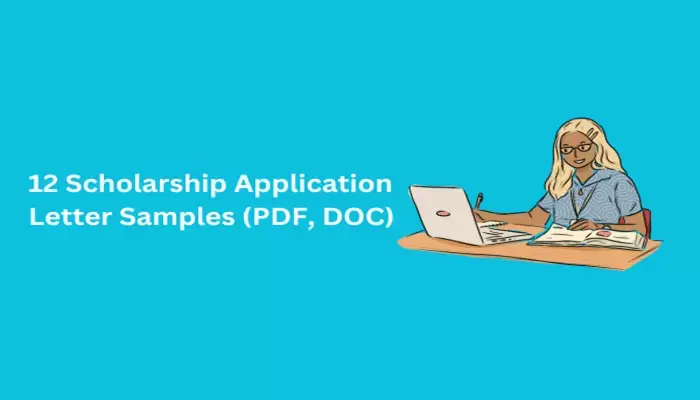
A scholarship application letter is a formal letter written by a student to an organization that provides financial assistance to support a student's education. Scholarships are available to students of all levels of education, from high school to postgraduate level.
If you're a student, applying for scholarships is one of the best ways to fund your education and a well written scholarship application letter is required to help you get one.
In a scholarship application letter, you will be expected to provide useful information about your accomplishments as a student and why you think you're a deserving candidate.
Before you start drafting your scholarship letter, review the requirements for the scholarship. This will help you have a better understanding of the ideal candidate the scholarship committee requires. You'll also know the credentials and information to include in your letter.
In this guide, we will discuss how to write a good scholarship application letter, a good application letter format and also provide 12 scholarship letter templates for you to download in pdf format.

What is a Scholarship Application Letter?
A Scholarship Application Letter is a formal letter a student writes to a scholarship committee to persuade them to be considered for a scholarship opportunity.
In a scholarship application letter, students are required to highlight their academic achievements as well as relevant skills and experiences that may not be outlined in their resume.
How to Write a Scholarship Application Letter?
Writing a scholarship application letter requires thorough understanding of the steps to write a good application.
If you want to learn how to write the best scholarship application letter that will guarantee a positive response from the scholarship review community, follow the steps below;
Always start your scholarship application letter with a professional salutation.
Keep your letter short, a good scholarship letter typically ranging from 300 to 500 words.
Ensure you give a clear reason for applying for the scholarship.
Always introduce yourself properly
Write about your relevant academic achievements, work experience, extracurricular activities, and any skills you may have.
Explain why you need the scholarship and how it will help you achieve your academic and career goals.
Write about your long term goals and close your letter with a strong conclusion summarizing key points in the letter.
Proofread your letter before submitting. You can give your letter to a friend to proofread for you- good scholarship application letters do not have typos or grammatical errors.
Always thank the scholarship committee for taking their time to read your letter and consider you for the scholarship.
Follow the correct scholarship letter format
Application for Scholarship Format
To write a good scholarship application letter, you have to be familiar with its structure.
Following the right scholarship format will help you compose your letter in a better way. A scholarship application letter has six major components which includes; the header, the salutation, introduction, the body, the conclusion and the closing.
The body of the letter contains the most important details required by the scholarship committee and it is usually divided into 2 or 3 paragraphs.
Here, we'll discuss the different components of a scholarship application letter. Keep reading to find out more.
Header: The header is the first part of a scholarship application letter located at the top of the letter. It should include your complete contact information such as your name, address, phone number, and email address.
You can also include the title of the letter typed in a bold font.
Salutation: Next is a professional salutation to begin the scholarship application letter. Examples of salutations you may use include; "Dear Scholarship Committee" “Respected Sir/Ma” or "To Whom It May Concern."
Introduction: After the salutation is the introductory paragraph. This is the official first paragraph of the letter where the scholarship applicant is expected to briefly introduce themselves and state the purpose of the letter.
The introduction can be written in three to five concise sentences.
An important tip to keep in mind when writing your introduction is to keep things as straight to the point as possible.
Body: the body of a scholarship application letter is where the main content lies. In the body of the letter, you'll provide details about your academic achievements, extracurricular activities, and any relevant experiences that will convince the scholarship committee to grant you the scholarship.
As we discussed earlier, the body of a scholarship application letter can be divided into 3 paragraphs. Let's discuss each of the paragraphs.
First Paragraph: in the first paragraph, write about your academic achievement and record. You can outline all the degrees you have gotten and their grades, you can also highlight your future plans for your academics.
Second Paragraph: The second paragraph details your work experience and extracurricular activities that may be relevant to the scholarship.
Third Paragraph: In the third paragraph, you can go a little further to explain how the scholarship will help you achieve your academic goals and why you deserve the scholarship.
Conclusion: The conclusion should be a strong statement summarising why you are a good fit for the scholarship. It should highlight key points you have made in the previous paragraphs and should fit into 2 or 3 sentences.
Lastly, thank the scholarship committee for their time and consideration in one sentence.
Closing: Always end your Scholarship Application Letter with a simple closing remark, like "Yours Sincerely" or "Kind Regards.”
It is important to keep your closing as professional as possible. The scholarship application letter is a formal letter so you want to avoid using any form of informal or casual remark or language.
Scholarship Application Letter Writing Format
A good scholarship application letter is required to follow a simple letter format that is easy to read and understand by the scholarship provider.
Here, we'll share a simple format for your scholarship application letter.
Always use a professional font like Times New Roman, Calibri or Arial
Use a font size between 10 and 12 points.
Your margins should be 1 inch on all sides, this makes your work easy to read.
Use single-spacing within paragraphs and double-spacing between paragraphs.
Avoid using a casual or informal tone in your Scholarship Application Letter.Also avoid the use of slangs or cliche words.
The scholarship application letter should have a formal tone.
Always include your name and contact information at the top of the scholarship application letter and introduce yourself in the first paragraph
Ensure you address the letter to the appropriate person or committee. Of you do not know who to address it to, use a generic term like ‘ Dear Sir/Ma’ or ‘Dear Scholarship Committee’
Scholarship Letter Template
Here are 12 scholarship letter template for you.
Application for Fellowship Sample Letter
Fellowship Sample Letter for download
Application Letter for Government Scholarship
Government Scholarship Sample Letter for download
Application Letter for Grant Scholarship
Grant Scholarship Sample Letter for download
Application Letter for Masters Scholarship
Masters scholarship sample letter for download, application letter for nursing scholarship , nursing scholarship sample letter for download, application letter for phd scholarship .
PhD Scholarship Sample Letter for download
Application Letter for Undergraduate Scholarship
Undergraduate Scholarship Sample Letter for download
Application Letter for Scholarship Grant
Scholarship Grant Sample Letter for download
Application Letter for Scholarship to Mayor
Scholarship to Mayor Sample Letter for download
Application Letter for Scholarship in University
Scholarship in University Sample Letter for download
Application Letter for Scholarship for Poor Students
Scholarship for Poor Students Sample Letter for download
Application for Scholarship to Principal
Scholarship to Principal Sample Letter for download
Application for Merit Scholarship Sample
Merit Scholarship Sample Letter for download
Do’s and Don'ts your Scholarship Application Letter
Here are some do's and don'ts to guide you as you draft your scholarship application letter.
Do not use the same application letter for every scholarship application
Do not paraphrase your CV
Do not quote others in your letter
Do not write about your flaws or deficiencies
Do not use slangs or informal language
Do not wait until last minute to submit your application letter
Do keep a positive tone
Do be concise
Do be honest
Do avoid typos or grammatical blunders
Do proofread
Do proper research before drafting your letter
Do highlight your accomplishments
With these scholarship application letter templates, you stand a chance at getting that scholarship you've always wanted. Download a template today and edit it the way you like.
Latest Scholarship Tips
- IT Schools In Lagos
- 20 Best Courses to Study in Nigeria 2024
- Federal Government student loan qualification, application and repayment
- How to Print JAMB Examination Slip 2024
- List Of NYSC Orientation Camps In Nigeria
- List Of Bauchi State Scholarship Accredited Centers And Their Locations 2024
- Canada Work Permit Visa Fees in Nigeria 2024
- Moniepoint Account Opening – How to Open Moniepoint Account
- How much is Canada Visa Fee in Nigeria 2024
- Universities offering law in Nigeria
Top Scholarships
- 2024 PTDF Scholarship Scheme for Undergraduate & Postgraduate Scholars in Nigeria Federal Universities
- 2024 Rehoboth Dream Solid Foundation Sponsorship Scholarship For Nigerian Undergraduate Students
- Zeribe Nwosu Foundation (ZNF) Annual Essay Competition for Nigerian Students 2024
- 2024-2025 Kwame Nkrumah University Of Science & Technology (KNUST) MasterCard Foundation Undergraduate Scholarships For African Students
- University Of Sheffield 2024 Masters Scholarship for African Students (Fully-funded)
- Western Union Foundation Fellowship Program 2024
- 2024 University Of Edinburgh Global Online Learning Masters Scholarship for Developing Countries
- 2025 Next Emerging Global Leader Scholar Award For International Students By American University
- 2024 Fellowship For Africans - International Service for Human Rights (ISHR)
- 2024 World Bank Group Africa Fellowship Program
Scholarship Tips
- Scholarships by Category
- Postgraduate
- Undergraduate
- College School
- Research Grant
- Entrepreneurs
- Graduate Programme
- Scholarships by Country
- United Kingdom
- United States
- South Africa
- Switzerland
Special Fundings
- Women Scholarships
- Study Abroad
- Partially Funded
- Fully Funded
- Innovation Network
- Innovation Exchange
- Innovation Awards
- Innovation Fellowships
- Innovation Funding
- Innovation Challenge
- Innovation Programme
- Government grants
- Scholarships by School
- University of Edinburgh
- University of Pretoria
- University of Ghana
- Oxford University
- University of Cambridge
- Harvard University
- University of Cape Town
- University of London
- Swansea University
- University of Bristol
- Scholarships by Sponsor
- Mastercard Foundation
- German Academic Exchange Service (DAAD)
- United Nations
- MTN Foundation
- African Union
- One Young World
- Access Bank PLC
- Privacy Policy
- Terms of Use
Scholarship Categories
- Undergraduate Scholarships
- Masters Scholarships
- Postgraduate Scholarships
- PhD Scholarships
- Study Abrod Scholarships
- NGO Scholarships
- JAMB CBT Centers
Scholarships By
- Scholarships by Course
- Scholarships by State
- Scholarships Gender
Other Locations
- Study Abroad Scholarships
- Scholarships for African Students
- Scholarships in UK
- Scholarships in Canada
- Study Abroad Community
How to write a winning motivation letter for a master’s scholarship
Motivation letters play a crucial role in applications for scholarships that fund a master’s degree. Find out why motivation letters for master’s scholarships are unique, and learn the dos and don’ts of writing a winning motivation letter.
Disclosure: This post may contain affiliate links, which means I may earn a small commission if you make a purchase using the links below at no additional cost to you . I only recommend products or services that I truly believe can benefit my audience. As always, my opinions are my own.
Why motivation letters for master’s scholarships differ from ‘regular’ ones
Motivation letters for master’s scholarships vs. cover letters, elements to include in a winning motivation letter for a master’s scholarship, writing style of an outstanding motivation letter for a master’s scholarship, length of a motivation letter for a master’s scholarship, structure of a motivation letter for a master’s scholarship, layout of motivation letter for a master’s scholarship, what to avoid in a motivation letter for a master’s scholarship.
Studying for a master’s degree can be expensive. Next to tuition fees, following a master’s degree is time-intensive which reduces a student’s earning ability. Therefore, securing a scholarship to study at a master’s level is not only a nice achievement. For many prospective master’s students, it is a necessity.
A key to securing a scholarship is an outstanding motivation letter. This motivation letter is different than a motivation letter that you would write as part of a job application.
Motivation letters for master’s scholarships are unique because they have to bring two points across simultaneously: The motivation of the applicant to pursue a specific master’s programme, and the expected benefits from receiving financial support to do so.
Regular motivation letters usually focus on just one aspect. For instance, on how an applicant can contribute to a company. Or on how a prospective master’s student fits and can contribute to a graduate degree programme.
Motivation letters for master’s scholarships, however, involve a more complex argumentation. Funding bodies that provide master’s scholarships usually want to see how the applicant upholds their values. Additionally, funding bodies are interested to learn how a master’s scholarship awarded to one person can have a wider societal impact.
Every scholarship is different, and requires different documents, styles and structures. However, a common misconception is that motivation letters for master’s scholarships automatically equal the applications’ cover letters.
Motivation letters for master’s scholarships are typically not the same as cover letters. Instead, they have to be submitted as separate documents as part of scholarship applications.
Scholarship applications, and especially those that involve a lot of money, tend to require a lot of information. Applicants often have to submit a cover letter, a separate and quite detailed motivation letter, a CV and a reference.
Therefore, always read and follow the specific instructions of each master’s scholarship!
You may also like: Deciding between a one- or a two-year master’s degree
Motivation letters for master’s scholarships should always be tailored to the specific scholarship description and funding body.
Nevertheless, several key elements have to be included in every motivation letter. The following questions help you to hit the high points:
- An introduction of who you are that extends beyond the information that is provided in your CV: What are your values? What motivates you? What are your ambitions and goals?
- A justification why a master’s degree helps you to achieve your goals: What is missing in your education? What do you want to learn and why?
- A motivation why you apply for the specific scholarship: How would this scholarship benefit you? What would the scholarship allow you to achieve? How do your values align with those of the scholarship’s funding body?
- A description of the expected impact of receiving the scholarship to earn a master’s degree: How will you put your master’s degree to good use after graduation? What impact will you have on your community or society at large? After receiving support, how will you pay it forward and help others?

If you are looking to elevate your writing and editing skills, I highly recommend enrolling in the course “ Good with Words: Writing and Editing Specialization “, which is a 4 course series offered by the University of Michigan. This comprehensive program is conveniently available as an online course on Coursera, allowing you to learn at your own pace. Plus, upon successful completion, you’ll have the opportunity to earn a valuable certificate to showcase your newfound expertise!
The best writing style for a master’s scholarship motivation letter is an elegant mix between personal and formal.
There are several tricks to write a motivation letter in a personal writing style:
- Write your motivation letter in a first person point of view, by using pronouns “I” and “me”
- Start your motivation letter with a personal story or anecdote
- Write in active voice (“ I experienced this situation as stressful “) instead of passive voice (“ This situation was stressful “).
- Use verbs that express thoughts, feelings and opinions , such as “ I feel “, “ I believe “, “ I suspect “, “ I disagree “
At the same time, make sure that your motivation letter uses a formal writing style:
- Make sure that your motivation letter follows a clear structure
- Write straightforward sentences , instead of sentences that are complex and difficult to follow
- Eliminate grammar and spelling mistakes
- Avoid contractions , such as “ don’t ” or “ won’t “. Instead, use the unshortened versions, such as “ do not ” or “ will not ”
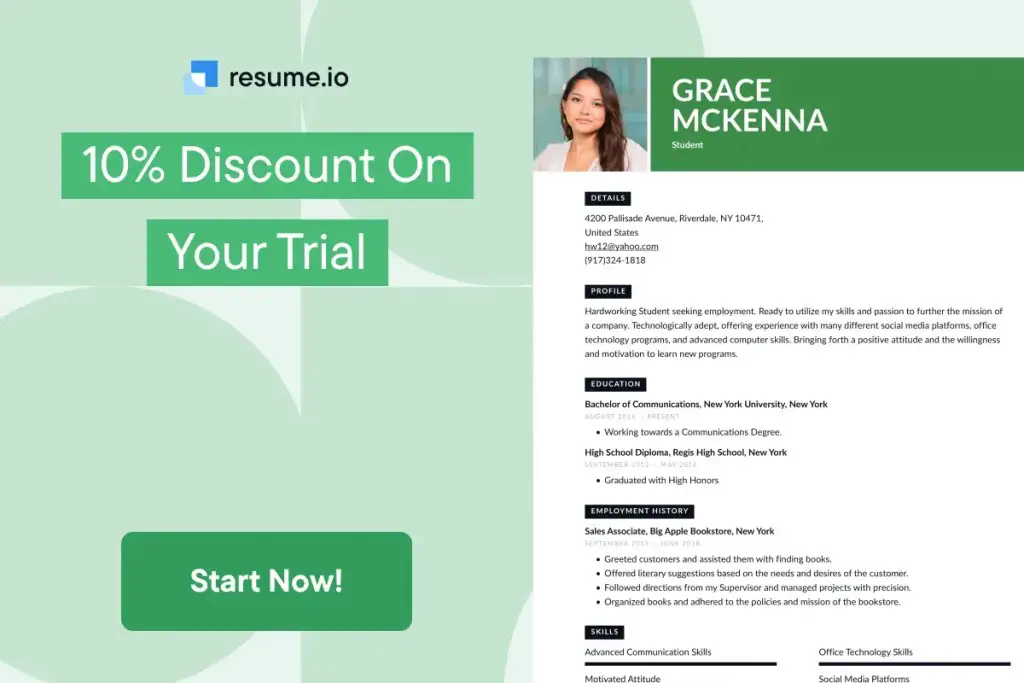
Most scholarships specify how long applicants’ motivation letters are supposed to be. The length often depends on whether the funding body requires a standalone motivation letter, or whether the motivation letter simultaneously represents the cover letter.
If no length indications are given, writing approximately 800 to 1000 words is a good guideline to follow. 1000 words results in two pages, single-spaced.
Motivation letters for master’s scholarships are typically a bit longer than regular cover letters. At the same time, they should not exceed two pages.
It is extremely important to follow a clear structure in a motivation letter for a master’s scholarship. A clear structure helps you to bring your points across. And it helps the reader to follow your line of argumentation.
At the most basic level, a strong motivation letter consists of the following parts:
- An introduction , in which you introduce yourself and tell the reader what to expect.
- A main body of text in which you present your arguments and provide evidence to support them.
- A conclusion , in which you summarise your key points.
Each part can consist of several paragraphs, though it is recommended to keep the introduction and conclusion to one, and a maximum of two, paragraphs.
To structure the main body of a motivation letter, develop one key argument per paragraph.
For instance, you could use the following structure, dividing your motivation letter into three parts, and seven paragraphs :
- Introduction (Paragraph 1)
- Your track record of accomplishments (Paragraph 2)
- Your ambitions (Paragraph 3)
- How a specific master’s degree would help you to accomplish your goals (Paragraph 4)
- How your ambitions and values overlap with those of the scholarship funding body (Paragraph 5)
- The expected results and (societal) impact if you receive the scholarship (Paragraph 6)
- Conclusion (Paragraph 7)
The layout of motivation letters for master’s scholarships differs depending on whether the letter is simultaneously the application’s cover letter, or has to be included as an attachment.
A motivation letter that also functions as the scholarship application’s cover letter should follow a formal letter format:
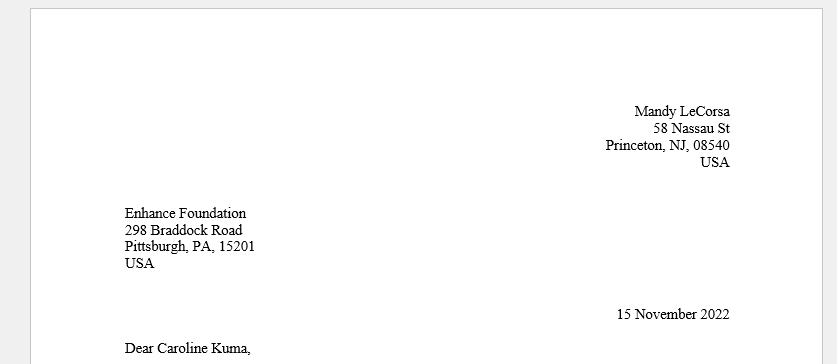
If the motivation letter is one separate part of the scholarship application, and not the cover letter, the situation is different. Assuming that the formal letter format is already used in the cover letter, there is no need to repeat it in the motivation letter. Just make sure to include your name, the document description and the scholarship title in the header of the document:

The most common mistake when it comes to motivation letters for master’s scholarships is simply not spending enough time and effort writing them.
Writing a tailored letter of motivation for each scholarship that you are applying to is a lot of work. Therefore, it comes as no surprise that many applicants are tempted to use the same motivation letter for several scholarship applications. This is a bad idea though!
Never ever use a generic motivation letter to apply for a master’s scholarship.
Why? It will simply not work out. Every funding body and every scholarship is unique. Therefore, every letter of motivation should be unique as well.
For instance, if you apply to a political foundation, you should emphasise your political engagement and how your views overlap with that of the political funding party. If you apply for a scholarship from a faith-based organisation, make sure to emphasise how your faith and values are aligned with the organisation.
Lastly, writing your motivation letter last-minute. Instead, start preparing it at least two weeks before the submission deadline. It allows you to edit and improve your motivation letter several times, and to receive feedback from someone else. Another pair of eyes helps you to spot mistakes and point out unclear argumentations. This feedback is invaluable!
Master Academia
Get new content delivered directly to your inbox.
Subscribe and receive Master Academia's quarterly newsletter.
All you need to know about career objectives on PhD resumes
How to paraphrase a quote: 4 simple strategies, related articles.

Are summer schools for master’s students worth it?
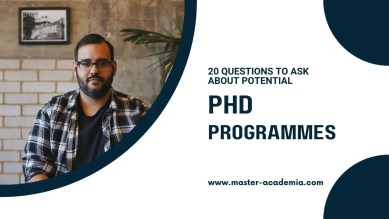
20 questions to ask about potential PhD programmes

How many conferences postgrads should attend

10 common challenges of first-year students (+ practical solutions)
- Applying For Scholarships
How to Write a Scholarship Motivation Letter in 2023
Jennifer Finetti Sep 26, 2022

Get our best scholarship practices, insights & tips delivered to your inbox
Thank you for subscribing!
A scholarship motivation letter can make or break your application. This is your opportunity to showcase your knowledge before an in-person interview. Motivation letters are not required for every application. Yet when they are necessary, they are critical. In this guide, we will provide tips for writing a scholarship motivation letter.
What is a scholarship motivation letter?
A motivation letter is like a cover letter you may include with a job application and resume. The goal of the letter is to explain:
- Why you are a good candidate for the scholarship
- What you plan to do with the education you receive.
Review committees often use motivation letters to narrow down their pool of applicants. Then they assess the rest of the application from the candidates they like best.
Motivation letters are usually required for graduate-level scholarships. Sometimes, you may need to write one for specialty programs at a bachelor’s level too. If you have the option to include a motivation letter with your scholarship application, take it. This may be the only chance you have to wow the review committee.
The fastest path to earning scholarships
Simplify and focus your application process with the one-stop platform for vetted scholarships.
Motivation letter for scholarship applications – general guidelines
Usually, the application will not specify how long your motivation letter should be. You will need to use your best judgment to write a concise motivation letter. The letter should include:
- The most important elements of your resume
- Your education
- Your professional experiences and plans for the future.
Motivation letters are usually around 500-1,000 words. Split them into paragraphs for easy reading.

Tailor your motivation letter to fit the sholarship
Your motivation letter should link your future plans with the goals of the scholarship . How will you benefit from continued education in this field? How will you use this knowledge to support the mission of the scholarship provider?
Say that the scholarship is from an agency that supports wildlife preservation. Your letter should explain how you plan to apply your education towards a career in that field.
You also need to establish why you deserve this application more than other applicants. What specific experiences do you have now that set you apart from the rest? What specific plans do you have that will address a current issue in the world? Even if you currently have limited knowledge about the issue, use that to your advantage. Explain how you could thrive with more education and solve even more problems in the future.
The structure of a scholarship motivation letter
Scholarship motivation letters vary by award, but they usually consist of three elements:
- An introduction
- Three body paragraphs
- A conclusion
Your introduction should include your name, level of education and the degree program.
Your first body paragraph should include any work-related experience you have. This can include both paid and unpaid internships. You should show the growth of your career in chronological order. Finally, suggest where your career will go with continued education.
Your second body paragraph should explain what you hope to gain from your education. Think of which problems you aim to solve or uncover.
Your final body paragraph should explain your holistic plans for the future. Some ideas for inspiration:
- You can include extra education you plan to pursue after education.
- You can write about companies or agencies you’d like to work for after graduation.
- You can talk about programs or organizations you would like to develop.
Finally, your conclusion should re-emphasize why you are a good candidate for the scholarship.

What NOT to include when writing a scholarship motivation letter
Your scholarship motivation letter should be well-written with no grammar or spelling errors. Use a professional tone and advanced phrasing (no slang). Provide specific examples about your past, present and future. Stay away from vague generalizations. Vagueness suggests a lack of care or knowledge. Neither of these are impressive to a scholarship review committee.
Some final tips
Writing a motivation letter for scholarship applications takes time and commitment. Plan what you will say in advance, and allow at least three days to write the letter, review it, step away from it and edit it. This extra time will provide the best chance of success with your application.
A Sample Scholarship Motivation Letter
Julie Moore 9876 Smith St. Stillwater, OK 74074The Scholarship Committee 123 Learning Rd. Suite 4A Oklahoma City, OK 73127
To Whom It May Concern:
My name is Julie Moore and I am a third year student at Oklahoma State University. I am currently pursuing a five-year Bachelor of Architecture Degree. My plan is to follow up with a one-year master’s degree after I graduate.
In high school, I worked extensively with my local Habitat for Humanity branch to help build homes for low income families. I learned about the construction process from the ground up, and I discovered the importance of function in architectural design. The homes we built during my four years as a volunteer were never extravagant. They served their purpose and became a beacon of hope for their owners.
My education has been focused on this mindset: function over form, stability over showmanship. I have enrolled in several classes that crossover to the Architectural Engineering major. My goal is to have a comprehensive view of how design meets structure. I have worked on three extra-credit residential design projects under the supervision of my architecture professors (Dr. X and Dr. Y). This helped speed up my research and education.
My goal is to become an architect to create accessible, affordable housing opportunities in underprivileged communities. Living in a college town, I have seen countless rental properties available. Yet there are few homes for sale that are affordable enough for college students and first-time buyers. This is the case in many towns throughout America, especially areas with a low standard of living. I want to create neighborhoods that include affordable starter homes. This would enable low and middle-class families to build equity, avoid excessive debt, and create financial stability for their futures.
This summer, I will intern with LMNOP Architects. Upon completion of my master’s degree, I hope to continue there as I further develop my skills. After working under acclaimed residential architects Suzan Craft and Peter Wood, I would like to open my own architectural firm focused on developing inexpensive, high-quality housing. I also would like to work with Habitat for Humanity again, this time as an architect instead of a general laborer. I believe firmly in their mission to build “a world where everyone has a decent place to live.” I appreciate your consideration. With your help, I can continue my schooling in architecture and design to bring accessible homes to those in need.
Sincerely, Julie Moore
- Scholarship Essay

Jennifer Finetti
As a parent who recently helped her own kids embark on their college journeys, Jennifer approaches the transition from high school to college from a unique perspective. She truly enjoys engaging with students – helping them to build the confidence, knowledge, and insight needed to pursue their educational and career goals, while also empowering them with the strategies and skills needed to access scholarships and financial aid that can help limit college costs. She understands the importance of ensuring access to the edtech tools and resources that can make this process easier and more equitable - this drive to support underserved populations is what drew her to ScholarshipOwl. Jennifer has coached students from around the world, as well as in-person with local students in her own community. Her areas of focus include career exploration, major selection, college search and selection, college application assistance, financial aid and scholarship consultation, essay review and feedback, and more. She works with students who are at the top of their class, as well as those who are struggling. She firmly believes that all students, regardless of their circumstances, can succeed if they stay focused and work hard in school. Jennifer earned her MA in Counseling Psychology from National University, and her BA in Psychology from University of California, Santa Cruz.
Related Stories View All

The Ultimate Guide to College Scholarships

Write Your Own Epic Scholarship Recommendation Letter (2022-2023)

How to Write a Great 500 Word Essay
Get started with scholarshipowl.
Simplify and focus your application process with the one-stop platform for vetted scholarships
Published In: Letters
Scholarship Application Letter Samples (Writing a Strong Application)
Students sometimes face financial constraints challenges, making it hard for them to afford tuition fees as stipulated by their school of choice. Nevertheless, several colleges, universities, and organizations offer scholarships to eligible students to assist them financially. If you are unsure about how to write a strong Scholarship application letter, this article will be very useful to you. in this article, we have provided a step-by-step guide on how to write a killer scholarship application letter, several samples, and templates that are readily available for download for your reference.
What is a Scholarship Application Letter?
A scholarship cover letter is a useful document that allows applicants to express themselves and deliver details about their goals and abilities. The scholarship letter usually serves as a formal introduction to the scholarship committee in addition to identifying you as the prime candidate for the specific scholarship being offered and is accompanied by the sponsoring organization’s materials.
A candidate justifies himself/herself as an outstanding student in overall studies and extracurricular activities to increase their chances of getting the scholarship through a scholarship application letter.
Sections of a Scholarship Application Letter (Format)
A scholarship cover letter should have different sections and paragraphs, with each part serving a different role:
Introduction
Provide your contact information, e.g., full names, address, and telephone number. Briefly introduce yourself to the scholarship committee or individual and add a milestone achievement to draw their attention.
First Paragraph
Your introductory paragraph should focus on your educational and career goals. Discuss your interests and show passion in the chosen area of course work. Give the funding organization all the reasons to choose to invest in you and help further your education. In simpler terms, show your worth.
Second Paragraph
The second paragraph needs to focus on your strengths. If you have participated in any extracurricular activities or you have had your hands on any community work, include it in this paragraph. Any academic accolades and awards should also be listed in this section. The second paragraph is usually all about selling yourself and your capabilities to the decision-makers of a scholarship.
Third Paragraph
In this section, talk about why it should be considered for the application. Speak directly to the individual or organization that is handling out the money in a professional manner. However, refrain from acting desperate for money, but rather, desperate for education. It is not wrong to talk about books, food, housing, and other school costs.
You can add the fourth paragraph if there is much to talk about.
Call to action paragraph
This is the last paragraph of your letter. Close strongly by highlighting any talents or special skills you possess and letting the funding company or individual feel confident that the course work will be completed. Restate your educational and career goals, and include a call-to-action statement.
Length of your cover letter
The letter should be around 1-2 pages maximum. Use font 12 and double spacing to make it easy to read through.Proofread your letter for clerical errors to ensure it is perfect.
How to Write
Cover letters written for scholarships may break or increase your chances of getting the scholarship you badly need. These letters are not very different from job application letters, but the idea is to market your capabilities to the scholarship providers. Thus, as a student in need of a scholarship, you need to understand how to write a good cover letter to improve your personal goals. The following are some tips on how to write an appealing scholarship application cover letter.
Explain why you are a good match for the scholarship
A well-written scholarship cover letter is an opportunity for you to overview your main strengths from an educational and professional point of view, your career development goals and plans, why you would be suitable for this scholarship, and how it will benefit you if selected. Ensure that you cover all this information using specific examples where possible.
Use a formal tone, a clear structure, and check spellings
Use a formal tone to write your scholarship application cover letter and employ a clear, concise, structured flow. Make sure to check and correct any spelling and grammar mistakes. Try asking another person with an objective eye to proofread your cover before submitting it to ensure you did a successful one. This also allows you to minimize the risk of any grammatical or spelling errors and helps you remove any unclear, redundant, or irrelevant information.
Match your cover letter to the context
Certain situations of scholarship applications require you to attach a cover letter. During the same time, you might be applying for admission to a program or an institution, or you may be applying for a grant or scholarship to cover your tuition fees or any other costs related to a program you have already been accepted to.
If your scholarship letter is intended for the initial case, begin your letter with a formal address and greetings, then do a short paragraph explaining your academic skills, strengths, and achievements. Your second paragraph should explain why you need the scholarship to fund your studies. The third paragraph should describe how the given program, project, or course you are applying for will help you meet your goals and objectives and how you will contribute during your studies. Your closing should be polite and formal.
If you are applying for funding for a program you have already been admitted to, consider these few aspects.
- Use a formal address and greetings, then a brief paragraph emphasizing your academic skills.
- The second paragraph should emphasize your financial situation and the reasons prompting you to need the funding
- Your third paragraph should be about your interest in studying in that particular institution and how much value you will get from it,
- Conclude your cover letter strongly by highlighting your strengths, academic skills, and goals to ensure your success.
What “NOT” to Include in your Letter
- Avoid adding your weaknesses: Do not mention any of your weaknesses. Since many people will be sending in their applications every day, you don’t want to come off as the weaker applicant, thereby reducing your chances of landing the scholarship.
- Don’t use an informal tone. Always be professional when writing the letter. You don’t know who will be reviewing your application, so make sure that you stick to a formal tone.
- Never submit your cover letter before proofreading. After drafting your letter, make sure to go through it several times to ensure it is free of any errors and that every detail is well captured.
- Avoid adding unnecessary or untrue information: Since you are trying to sell yourself, don’t exaggerate too much. At times, honesty is the best policy. Don’t lie; be simple and straight forward in your writing.
- Do not hide your need for financial aid: Remember why you are writing the application. Do not be embarrassed to ask for help.
Scholarship Application Letter Templates & Samples
Whether you are writing a scholarship application letter to gain admission to a university or college, appeal for financial assistance, or apply for further postgraduate studies, you can download and use our Free and premium templates and quickly customize them to fit your specific needs and objective. Download our templates today and get started on your scholarship application.
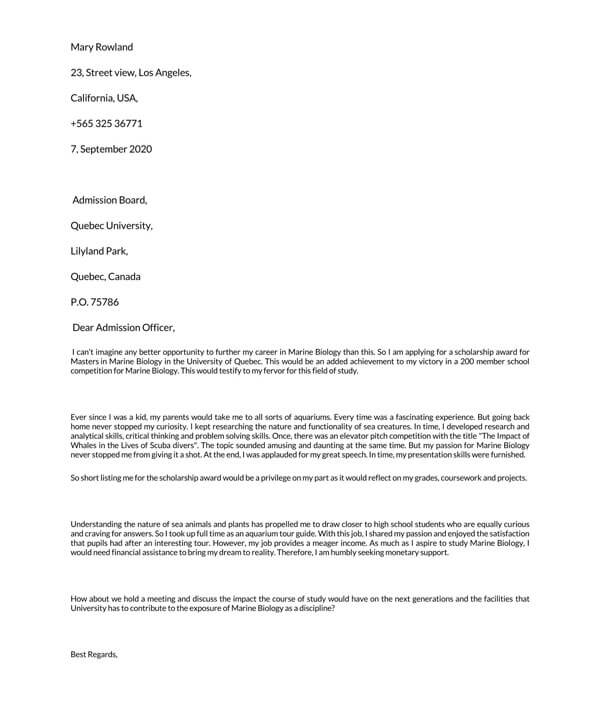
What do Scholarship Committees Require from Applicants?
Generally, scholarship committees look for some or all the following qualities in an ideal applicant.
- Candidate’s motivation and seriousness in the chosen field of study
- A detailed description of the specific course work or area of study
- The creativity and originality of the letter
- Leadership skills of the candidate as well as their emotional stability
- An applicant’s ability to collaborate with others and the desire to excel.
Tips for a Strong Application Letter
Here are a few tips to help you write a strong scholarship application letter:
- Explain why you are the perfect candidate for the scholarship: remember that you are trying to convince the scholarship committee that you are the perfect candidate for the scholarship. Convince them why they should choose you.
- Use a formal tone when writing and ensure that your letter has a clear structure and is free of any grammatical errors
- Write a great cover letter to go with your application letter: After drafting your application letter, write a great cover letter to act as an introduction and an invitation to review your application.
Many students fall under the category of those who are eligible for a scholarship. They may have excellent academic transcripts, or a list of extracurricular activities to boast about or a list of talents and hobbies. Whether you have those things or not, scholarship committees look for something else. That is students who have overcome challenges and major struggles, students who are leaders in their community, and those who have hobbies. It is a great idea to submit a scholarship application letter as it is your opportunity to think about how you can make yourself stand out from the other applicants and be selected for that scholarship sponsorship.
Related Documents

How to Write a Good Cover Letter for Scholarship Application (5 Sample Examples PDF)
Scholarship Application 14,337 views 06 April, 2022
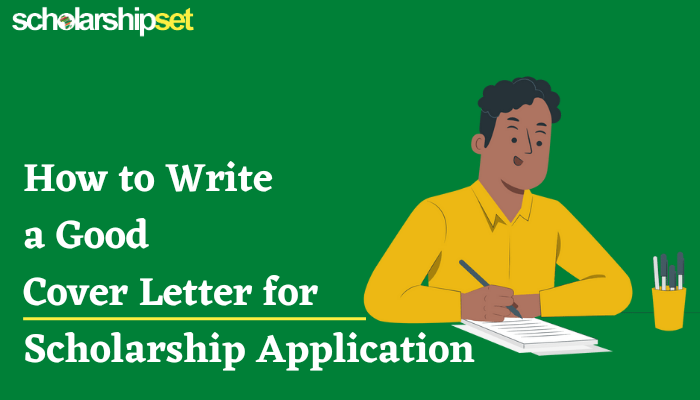
Do you need to write a good cover letter for scholarship, or you are in search of scholarship cover letter samples to guide you with your scholarship request? This article provides cover letter format for scholarship application, as well as cover letter for scholarship application pdf examples as templates for you to start writing your proposal letter for scholarship.
Every scholarship evaluation board or committee have a lot to take into consideration when making the decision on who to award a scholarship to. Decisions can be based on academic excellence and skills, or on economic factors such as low income.
In many cases when applying for a scholarship, the scholarship committee may ask you to attach a scholarship application cover letter. You should also provide details about how the scholarship will help you reach your educational and career goals when writing a cover letter for a scholarship.
Note that your letter of interest for scholarship, is one of your best chances to stand out from other candidates applying for the same scholarship, and you need to take it seriously. Read on to find out some tips on how to write a simple application letter for scholarship, which can also become the best cover letter for scholarship application when compared to cover letters from other candidates.
Related: How To Write A Good Recommendation Letter For Scholarship Application (8 Sample Examples PDF)
Article guide:.
What is a scholarship cover letter?
Parts of a cover letter for scholarship
TIPS: What to do when writing a cover letter for scholarship application
TIPS: What not to do when writing a cover letter for scholarship application
Letter formatting for a scholarship cover letter
Sample cover letter for scholarship application
Other sample examples of cover letter for scholarship application
What is a Scholarship Cover Letter?
A cover letter for scholarship application is an important and useful document that gives applicants for a scholarship the opportunity to express themselves and also provide details about their capabilities and goals.
A scholarship proposal letter which should be written to a scholarship committee, should explain what makes you a great candidate for the award, because the scholarship committee wants to find the most fitting students to invest their money in. Make them see the reasons why they should they choose you.
There are lots of applicants with excellent academic record who fit the bill of a great scholarship candidate. However, many scholarship committees look beyond just grades when choosing their preferred candidate for the award.
They look at students who have overcome struggles, as well as students who are leaders in their community, with unique hobbies. Your cover letter for award application is your best choice at convincing the scholarship committee.
Parts of a Cover Letter for Scholarship
Whether you are writing for an undergraduate scholarship award, or a cover letter for masters’ scholarship, or a cover letter for PhD scholarship, you need to ensure that your cover sheet for scholarship application meets the application standards.
Specifically, there are five parts of a cover letter for applying scholarship.
Personal information
Just like every other ordinary letter, there must be a head section that shows your full name, department, University name, and address, on your cover page for scholarship application.
Salutation and opening paragraph
Start with an opening paragraph that briefly introduces who you are, and your relevant experience, how you learned about the scholarship, and why you are interested in applying.
Body paragraph(s)
What you are really addressing in this section is what makes you deserving of this particular scholarship, so make sure that everything you include in your cover letter for scholarship essay, bolsters your case. You may need just one body paragraph or several (always check the length requirement first).
Closing paragraph
End your application cover letter for scholarship with a closing paragraph that restates your interest in the scholarship and why you should be considered. Include a call to action to inspire the committee to reach out to you.
You can do this with a simple "sincerely / best regards", your full name and signature.
TIPS: What to do When Writing a Cover Letter for Scholarship Application
When writing a cover letter applying for scholarship, here are some tips on what you should do:
Be polite and honest
You don't need to write your family problems all at once in your scholarship cover letter. Simply explain your reason for needing financial aid in a polite and clear manner.
Keep your letter concise
When writing a cover letter for scholarship, you should try to make it short and direct as possible.
Attach necessary documents
On submitting your scholarship cover letter, ensure that you attach necessary documents that prove the validity of your challenges to make your story convincing.
Submit your request on time
Submit your cover letter as soon as possible to give your college ample time to review your request.
Go by the book
Stick to the college's procedure on how to appeal the initial scholarship package.
TIPS: What Not to Do When Writing a Cover Letter for Scholarship Application
Here are some tips on what you should avoid when writing a cover letter for scholarship:
Do not neglect your achievements
When writing a cover letter for scholarship application, don't feel timid to include details about your hard work and success record.
Do not show arrogance
You didn't save money with a scholarship committee for your education. Therefore, you shouldn't sound rude or too demanding when writing your cover letter.
Do not generalize your address
Don't just address your cover letter directly to the scholarship committee office, if possible, address your cover letter directly to the designated person at the committee office.
Don't be in a haste to submit your letter
Do not send your scholarship cover letter without proofreading for possible grammatical errors.
Avoid unnecessary complaints
Remember your cover letter is not for you to write about historical problems in your family, so avoid complaining too much or demanding too much sympathy.
Letter Formatting for a Scholarship Cover Letter
The structure and layout of a scholarship cover letter is as important as its content. This means that your letter must be readable and pleasing to the eye. Therefore, only a good scholarship cover letter format can catch the attention of the recipient.
Here are some tips to follow for a good scholarship cover letter format:
Maximum number of pages should not exceed one and a half
Set one inch margin on all sides
All texts should be aligned to the left (pleasing to the eye)
Line spacing is 1 or 1. 5 inch
Double spacing between the paragraphs
Use fonts like Calibri, Arial and Times New Roman
Send cover letter in a PDF format
Sample Cover Letter for Scholarship Application
We understand that you might need a scholarship cover letter maker, or a good cover letter for scholarship application sample to guide you when writing your cover letter, hence why we have included a cover letter for a scholarship sample in this section.
For proper demonstration on how to write a good scholarship cover letter, here is an eye catching scholarship cover letter template, which is a good sample for undergrad and masters’ application, and also a good sample of cover letter for PhD scholarship.
Grace Nicholas
Student, Department of Computer Science
Concordia University College of Alberta
Edmonton, AB D9E 3E3
5th April, 2022
Joe Barnabas
Student Affairs Department
Edmonton, F6 D93E BE3
RE: Scholarship Application
Dear Mr. Barnabas,
I am writing to submit my application for Concordia University College of Alberta’s Scholarship Program for fall 2022. Presently, I am a first-year student of the Master of Computer Science program. In order to prove my diligence, I have enclosed copies of my academic accomplishments.
I am currently facing some financial difficulties, which has seen me struggle to pay my fee for the fall semester. I am planning to obtain a part-time job to manage the finances of my studies, but it would not be enough to cover the full tuition and accommodation fee. Based on my deprived financial condition, I request for a student scholarship so that I would be able to continue my studies in anticipation of an improved financial situation.
If you have any questions regarding my application, please feel free to contact me anytime at (000) 555-0335.
Thank you for your time and consideration.
(Signature)
Cover Letter for Scholarship Application PDF
So the above section of this article entails a sample cover letter for scholarship application. For faster accessibility, we would advise you to download the cover letter sample PDF, so you can fully absorb every step that have been applied.
Download cover letter for a scholarship sample
Cover Letter Template Scholarship PDF
This section will guide through some scholarship cover letter examples which will also act as a cover letter for scholarship application template for you to start with.
There are several circumstances that require different types of cover letter for scholarships. With different cover letter for scholarship application examples, you will have a clear picture of how yours should look like. Hence, why we have different cover letter for scholarship pdf examples in this section, which you can download for future reference.
Here are five cover letter template scholarship PDF examples.
Cover Letter for Fellowship Application PDF
Download cover letter for fellowship application pdf
Cover Letter for University Scholarship
Download cover letter for university scholarship pdf
Cover Letter for PhD Scholarship Sample
Download cover letter for phd scholarship sample pdf
Cover Letter for Master’s Degree Scholarship
Download cover letter for master degree scholarship pdf
Student Loan Appeal Letter Sample
Download student loan appeal letter sample pdf
Hopefully this guide on writing a scholarship cover letter will be helpful when you need to apply for scholarships. If you are searching for scholarships abroad, see our list of ongoing scholarships you can apply for. However, if your scholarship application gets denied, you can search for countries that allow you to work while studying.
Read: 13 Best Countries for International Students to Study and Work 2022
Read more related articles:
How to Write a Good Letter of Recommendation for Students (10 PDF Sample Examples)
How to Write a Good CV for Students - Resume Examples for Students (PDF)
Top 40 Scholarship Interview Questions And Answers Example (PDF for Download)
How To Write A Personal Statement For Masters (17 PDF Sample Examples)
Latest Scholarship Tips
- Top 20 Poorest Country in Africa
- 10 Best Banks in South Africa 2024- Top Banks in South Africa
- 20 Letter of Recommendation for Scholarship PDF
- 10 Best Countries to Relocate 2024
- 20 Online MBA Scholarships for African Students 2024
- Best Africa Tourist Destinations - Top African Holiday Destinations
- Best Universities in Africa - Top Universities in Africa
- Best Universities in Egypt - Top Universities in Egypt
- South Africa Entry Requirements
- Medical Schools In South Africa
- Best Scholarships
- Mastercard Foundation Graduate Scholars Program for Africans 2024
- University of Sheffield Africa Scholarship for African Students 2024
- University of Pretoria Mastercard Foundation 2024 Scholarship Program for African Students
- ACU 2024 Queen Elizabeth Commonwealth Scholarships for Developing Countries
- PAGES 2024 Africa Mobility Fellowship for Early-Career Scientists
- UN 2024 Fellowship Programme for People of African Descent
- 2024 University of Melbourne Graduate Research Scholarships
- Eira Francis Davies Scholarship for Female Students at Swansea University 2024
Scholarship Tips
Scholarships by country to study.
- South Africa
- United Kingdom
- United States
Scholarships by Category
- Postgraduate
- Undergraduate
- College School
- Entrepreneurs
- Women Scholarships
- Fully Funded
Scholarships by Country of Origin
Scholarships by institution / company.
- German Academic Exchange Service (DAAD)
- MasterCard Foundation
- The World Academy of Sciences (TWAS)
- United Nations
Scholarships by School
- University of Edinburgh
- University of Oxford
- University of Pretoria
- Flinders University
- University of Ghana
- University of Cape Town
What are your chances of acceptance?
Calculate for all schools, your chance of acceptance.
Your chancing factors
Extracurriculars.
How to Write a Personal Statement for a Scholarship + Examples
What’s covered:, what is the purpose of the scholarship personal statement, what to include in your personal statement, personal statement example: breakdown + analysis, how to make sure your writing is effective.
Either before or after you’ve gotten into your dream school, you’ll have to figure out how to pay for it. For most students, this involves a combination of financial aid, parent contributions, self-contributions, student loans, and scholarships/grants. Because scholarships are money out of someone else’s pocket that you never have to pay back, they are a great place to start!
Scholarships come in two forms: merit-based and need-based. Need-based scholarships are also often called grants. These designations tell you whether an organization looks at your financial situation when deciding about your scholarship.
Additionally, different scholarships fall under different categories based on the mission of the organization or person providing the scholarship’s financing. These missions typically emphasize different things like academic achievement, specific career goals, community service, leadership, family background, skill in the arts, or having overcome hardship. As you select scholarships to apply for and complete your applications, you should keep these missions in mind.
No matter what type of scholarship you are applying for, you will be asked to provide the review committee with standard materials. This includes your transcript, GPA, and resume/extracurriculars, but also, importantly, your personal statement. A scholarship personal statement is a bit different from your normal college essay, so we’ve put together this guide and some examples to help you get started!
The purpose of your personal statement is to help a review committee learn more about your personality, values, goals, and what makes you special. Ultimately, like with your college essays, you are trying to humanize your profile beyond your transcript, GPA, and test scores.
College essays all have one goal in mind (which is why you can apply to multiple schools at once through applications like the Common App or Coalition App): convince admissions officers that you would be a valuable addition to the university environment. The goal of your scholarship personal statement is different and differs more from one scholarship to the next. Rather than convincing various review committees that you are a generally good candidate for extra funding for college, you need to convince each review committee that your values have historically aligned with their organization’s mission and will continue to align with their organization’s mission.
Common missions amongst those who give scholarships include:
- Providing opportunities for students with career ambitions in a particular field
- Helping students who have experienced unexpected hardship
- Supporting students who show outstanding academic achievement
- Funding the arts through investing in young artists with strong technical skill
- Supporting the development of civic-minded community service leaders of the future
- Providing opportunities for historically underrepresented ethnic communities
If a specific mission like this is outlined on an organization’s website or in the promotional material for its scholarship, the purpose of your personal statement is to show how you exemplify that mission.
Some scholarships ask for your personal statement to be guided by a prompt, while others leave things open for interpretation. When you are provided a prompt, it is obvious what you must do: answer the prompt. When you are not provided a prompt, you want to write a personal statement that is essentially a small-scale autobiography where you position yourself as a good investment. In either case, you should identify a focus or theme for what you are trying to say about yourself so that your application does not get lost in the shuffle.
Prompts include questions like:
- Why do you deserve this scholarship?
- How have you shown your commitment to (leadership/community service/diversity) in your community?
- When did you overcome adversity?
- Why is attending college important to you?
If you are provided a prompt, develop a theme for your response that showcases both your values and your achievements. This will help your essay feel focused and will subsequently help the review committee to remember which candidate you were as they deliberate.
Themes include things like:
- I deserve this community service scholarship because my compassion for intergenerational trauma has inspired me to volunteer with a local after-school program. I didn’t just sympathize. I did something about my sympathy because that’s the type of person I am. Within the program, I have identified avenues for improvement and worked alongside full-time staff to develop new strategies for increasing attendance.
- I overcame adversity when my mother had to have a major surgery two months after giving birth to my younger brother. I was just a kid but was thrown into a situation where I had to raise another kid. It was hard, but I’m the kind of person who tries to grow from hard times and, through my experience taking care of a baby, I learned the importance of listening to body language and nonverbal cues to understand the needs of others (baby and nonbaby, alike).
Without a prompt, clarity can be harder to achieve. That said, it is of the utmost importance that you find a focus. First, think about both your goals and your values.
Types of goals include:
- Career goals
- Goals for personal growth
- The type of friend you want to be
- The change you want to make in the world
Values could include:
- Authenticity
- And many more!
After you write out your goals/values, write out your achievements to see what goals/values you have “proof” of your commitment to. Your essay will ultimately be an exploration of your goal/value, what you have done about your goal/value in the past, and what you aspire to in the future.
You might be tempted to reflect on areas for improvement, but scholarships care about you living out your values. It is not enough to aspire to be exemplary in leadership, community service, or your academic field. For scholarships, you have to already be exemplary.
Finally, keep in mind that the review committee likely already has a copy of your extracurricular activities and involvement. Pick one or two accomplishments, then strive for depth, not breadth as you explore them.
My interest in the field of neuroscience began at a young age. When I was twelve years old, my sister developed a condition called Pseudotumor Cerebri following multiple concussions during a basketball game. It took the doctors over six months to make a proper diagnosis, followed by three years of treatment before she recovered. During this time, my love for neuroscience was sparked as I began to research her condition and, then, other neurocognitive conditions. Later, my love of neuroscience was amplified when my mother began to suffer from brain-related health issues. My mother had been a practicing attorney in Dallas for over twenty years. She was a determined litigator who relentlessly tried difficult cases that changed people’s lives. Now, she suffers from a cognitive impairment and is no longer able to practice law. Oftentimes, she has headaches, she gets “cloudy,” her executive functioning slows down, she feels overwhelmed, and she forgets things. My mother has gone from being the strong, confident, emotional and financial caretaker of our family to needing significant help on a daily basis. Once again, with this illness came a lot of research on my part — research that encouraged me to pursue my dreams of exploring neuroscience.
Due to my experiences with my mother and sister when I was in middle school, I knew that I wanted to make a difference in the field of neuroscience. I also knew that, to obtain this goal, I needed to maintain superior grades in school while also pursuing opportunities outside of school to further my education. In school, I was able to maintain superior grades to the point where I am currently valedictorian in a class of 567 students. In addition, in school, I challenged myself by taking 16 Advanced Placement classes and 19 Honors classes. Two of the most beneficial classes were AP Capstone Seminar and AP Capstone Research. AP Capstone Seminar and AP Capstone Research are research-oriented classes where students are given the opportunity to pursue whatever track their research takes them down. As a junior in AP Capstone Seminar, I researched the effects of harmful pesticide use on the prevalence of Autism Spectrum Disorder (ASD) in children. This year, as a senior in AP Capstone Research, I am learning about the effects of medical marijuana on the treatment of Multiple Sclerosis (MS).
Outside of school, I furthered my education through taking advantage of the Duke TiP summer program. Duke TiP is a summer program run by Duke University where students who score extremely well on the SAT as middle schoolers are able to take college classes at different universities throughout the summers of their middle school and high school years. I took advantage of this opportunity twice. First, I went to Trinity University in San Antonio to expand my horizons and learn more about debate. However, once I was done exploring, I decided I wanted to go into neuroscience. This led me to take an Abnormal Psychology class at Duke University’s West Campus. This class opened my eyes to the interaction between neuroscience and mental health, mental illness, and personality. Years later, I am currently continuing my education outside of school as an intern at the University of Texas Dallas Center for Brain Health. Through this internship, I have been able to see different aspects of neuroscience including brain pattern testing, virtual reality therapy, and longitudinal research studies. With this background, I have positioned myself to be accepted by top neuroscience programs throughout the nation. So far, I have been accepted to the neuroscience department of University of Southern California, the University of Virginia, the University of Texas, and Southern Methodist University, as well as the chemistry department at University of North Carolina–Chapel Hill.
It is with this passion for neuroscience driven by my family and passion for education driven by internal motivation that I will set out to conquer my career objectives. My educational aspirations consist of acquiring a bachelor’s degree in a biological or health science that would assist me in pursuing a medical career as a neuroscience researcher. I decided to attain a career as a researcher since my passion has always been assisting others and trying to improve their quality of life. After obtaining my Masters and my PhD, I plan to become a professor at a prestigious university and continue performing lab research on cognitive disorders. I am particularly interested in disorders such as Autism Spectrum Disorder (ASD). In the lab, I hope to find different therapies and medications to help treat the 3.5 million people around the world suffering from ASD. Furthermore, I want to contribute back to underserved populations that struggle because they do not have as much access to medical assistance as other privileged groups. As such, I hope to do a part of my research in less developed or developing Spanish-speaking countries. This will also allow me to pursue my love of Spanish while pursuing my love of neuroscience. I think that following such a career path will provide me the opportunity to learn about the medical needs of the autistic community and improve their quality of health. Furthermore, I hope to train a new generation of students to strive to research and make comparable discoveries. Whether it be through virtual reality labs or new drug discoveries, I believe that research leads to innovation which leads to a brighter future.
This student does a great job of making themself appear competent and dedicated to the field of neuroscience. This is primarily because they provided tangible evidence of how they have pursued their dedication in the past—through their AP Capstone courses, their Abnormal Psychology class at Duke TiP, and their internship at UTD. There is no doubt in the mind of a reader that this student is high-achieving.
This student also engages successfully with a past-future trajectory, where they end with a vision of how they will continue to use neuroscience in the future. This helps the review committee see what they are investing in and the ways that their money will go to good use.
This student has two major areas for improvement. As we have said, the purpose of a personal statement is for a student to humanize themself to a review committee. This student struggles to depict themself separately from their academic achievements. A solution to this would be for the student to establish a theme towards the beginning of their essay that relates to both their values as a human and their achievements.
At the beginning of the essay, the student explores how their interest in neuroscience began. They explain their interest through the following sentences: “During this time, my love for neuroscience was sparked as I began to research her condition and, then, other neurocognitive conditions” and “Once again, with this illness came a lot of research on my part — research that encouraged me to pursue my dreams of exploring neuroscience.” The student made the great decision to tell the backstory of their interest, but they described their research in very mundane and redundant terms. Instead, they could have focused on their value of intellectual curiosity as a magnetic force that encouraged them to research their mother and sister’s ailments. Curiosity, then, could serve as a value-related thematic throughline to taking AP Capstone classes, taking college courses during the summer that weren’t required, and interning before even graduating high school.
A second area for improvement would be avoiding statistics. As the student identifies their valedictorian status and the number of AP classes they have taken, they might turn away certain personalities on a review committee by appearing braggy. Even further, these statistics are a waste of space. The review committee already has access to this information. These words distract from the major theme of the essay and would have been better used to humanize the student.
Throughout my academic career, I have been an avid scholar, constantly pushing myself towards ambitious goals. I held and continue to hold myself to a high standard, enrolling myself in rigorous curriculum, including Honors and Advanced Placement courses to stretch my mental potential. During my junior year of high school, I took four AP tests, two on the same day, and earned the AP Scholar with Honor Award. Additionally, I received the Letter of Commendation for the PSAT/NMSQT, and qualified for Rotary Top 100 Students both my freshman and senior year, a sign of my commitment to my studies. However, school has not been all about having the best GPA for me; beyond the numbers, I have a deep drive to learn which motivates me to do well academically. I truly enjoy learning new things, whether it be a new essay style or a math theorem. I always give each class my best effort and try my hardest on every assignment. My teachers have noticed this as well, and I have received school Lancer Awards and Student of the Month recognitions as a result. It is a major goal of mine to continue to aspire towards a high level of achievement regarding future educational and occupational endeavors; I plan on continuing this level of dedication throughout my educational career and implementing the skills I have learned and will learn into my college experience and beyond.
This fall, I will begin attending the University of California Los Angeles as an English major. I chose this major because I am fascinated by written language, especially its ability to convey powerful messages and emotions. I also enjoy delving into the works of other authors to analyze specific components of their writing to discover the meaning behind their words. In particular, I cannot wait to begin in-depth literary criticism and learn new stylistic techniques to add more depth to my writing. Furthermore, I recently went to UCLA’s Bruin Day, an event for incoming freshmen, where I was exposed to many different extracurriculars, some of which really piqued my interest. I plan on joining the Writing Success Program, where I can help students receive free writing help, and Mock Trial, where I can debate issues with peers in front of a real judge. The latter, combined with a strong writing background from my undergraduate English studies will be extremely beneficial because I plan to apply to law school after my undergraduate degree. As of now, my career goal is to become a civil rights lawyer, to stand up for those who are discriminated against and protect minority groups to proliferate equality.
As a lawyer, I wish to utilize legislation to ameliorate the plight of the millions of Americans who feel prejudice and help them receive equity in the workplace, society, and so on. Though this seems a daunting task, I feel that my work ethic and past experience will give me the jumpstart I need to establish myself as a successful lawyer and give a voice to those who are often unheard in today’s legal system. I have been a Girl Scout for over a decade and continually participate in community service for the homeless, elderly, veterans, and more. My most recent project was the Gold Award, which I conducted in the Fullerton School District. I facilitated over ten workshops where junior high students taught elementary pupils STEM principles such as density and aerodynamics via creative activities like building aluminum boats and paper airplanes. I also work at Kumon, a tutoring center, where I teach students to advance their academic success. I love my job, and helping students from local schools reach their potential fills me with much pride.
Both being a Girl Scout and working at Kumon have inspired me to help those in need, contributing significantly to my desire to become a lawyer and aid others. My extracurriculars have allowed me to gain a new perspective on both learning and teaching, and have solidified my will to help the less fortunate. In college, I hope to continue to gain knowledge and further develop my leadership skills, amassing qualities that will help me assist others. I plan to join multiple community service clubs, such as UCLA’s local outreach programs that directly aid residents of Los Angeles. I want to help my fellow pupils as well, and plan on volunteering at peer tutoring and peer editing programs on campus. After college, during my career, I want to use legal tactics to assist the underdog and take a chance on those who are often overlooked for opportunities. I wish to represent those that are scared to seek out help or cannot afford it. Rather than battling conflict with additional conflict, I want to implement peaceful but strong, efficient tactics that will help make my state, country, and eventually the world more welcoming to people of all ethnic and socioeconomic backgrounds. These goals are close to my heart and therefore I will be as diligent as I am passionate about them. My perseverance and love for learning and community service drive my ambition in both education and life as a whole, and the drive to make the world a better place is one that I will carry with me for my entire life.
This student emphasizes two values in this essay: hard work and community service. These are values that go together nicely, and definitely make sense with this student’s end goal of becoming a civil rights lawyer! That said, some changes could be made to the way the student presents their values that would make their personal statement more convincing and engaging.
Structurally, instead of using a past-future trajectory, this student starts by explaining their academic achievements, then explains their career goals, then explains their history of community service, then explains their future desires for community service. This structure loses the reader. Instead, the student should have started with either the past or the future.
This could look like 1) identifying their career goals, 2) explaining that hard work and a commitment to community service are necessary to get there, and 3) explaining that they aren’t worried because of their past commitment to hard work and community service. Or it could look like 1) providing examples of their hard work and community service in the past, then 2) explaining how those values will help them achieve their career goals.
Additionally, like with our other example, this student shows a heavy investment in statistics and spouting off accomplishments. This can be unappealing. Unfortunately, even when the student recognizes that they are doing this, writing “beyond the numbers, I have a deep drive to learn which motivates me to do well academically. I truly enjoy learning new things, whether it be a new essay style or a math theorem,” they continue on to cite their achievements, writing “My teachers have noticed this as well, and I have received school Lancer Awards and Student of the Month recognitions as a result.” They say they are going beyond the numbers, but they don’t go beyond the awards. They don’t look inward. One way to fix this would be to make community service the theme around which the essay operates, supplementing with statistics in ways that advance the image of the student as dedicated to community service.
Finally, this student would be more successful if they varied their sentence structure. While a small-scale autobiography can be good, if organized, every sentence should not begin with ‘I.’ The essay still needs to be engaging or the review committee might stop reading.
Feedback is ultimately any writer’s best source of improvement! To get your personal statement edited for free, use our Peer Review Essay Tool . With this tool, other students can tell you if your scholarship essay is effective and help you improve your essay so that you can have the best chances of gaining those extra funds!
Related CollegeVine Blog Posts


- 27 Motivation Letter for Scholarship Samples / Templates (pdf)
UK Universities 643 views 23 April
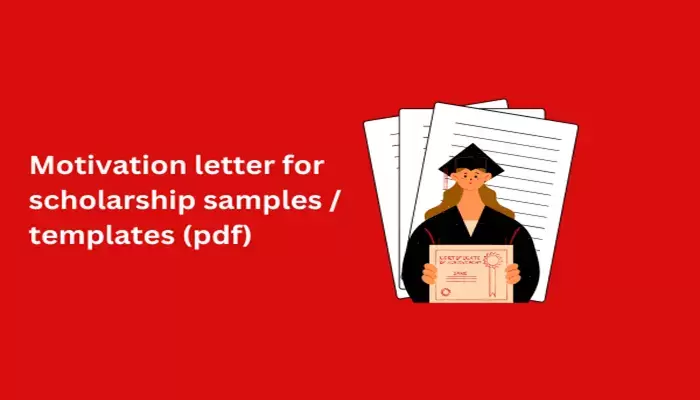
Do you want to write a motivation letter that will wow any academic committee you submit to? This article on a motivation letter for scholarship application sample pdf is just what you need.
In this guide, we'll teach you how to write a good motivation letter that will stand out among the hundreds of other submissions.
To set you on the path for success, we have also included pdf's you can download and use to compose your own.
What is a motivation letter?
A motivation letter or letter of Motivation or statement of purpose is a one page statement that supports a job, volunteer or scholarship application.
It is usually attached to a resume and explains why a candidate is a good fit for a position. In a motivation letter, you are expected to give enough points to convince the recipient of why you should be chosen for the role or award.
For a scholarship or degree, the letter of motivation reflects the individual's personality, skills, interests and accomplishments.
Whereas, for a job or internship, it is presented more like an application letter which outlines more of your skills and experiences on a professional level.
A motivation letter begins with an outline stating the contents of the letter. Then, a brief introduction, introduces yourself to the reader.
After the introduction, is the body of the letter. In the body, you are expected to explain the points you stated in the outline.
Keep it brief and compelling to keep the reader's attention. Remember, the purpose of the letter is to convince the reader.
Lastly, you write the conclusion which summarizes and closes the letter with a final note appreciating the reader for considering your application.
In the following sections, we'll show you how to write Motivation letters for different purposes.
Tips for Writing a Good Motivation Letter
If you want your application to stand out from that of other applicants, a good motivation letter is just what you need.
The best motivation letters are concise, and simple and highlight the candidate's aspirations, motivations, skills and interests. It is also written in a semi formal tone and is free from any kind of grammatical errors.
Before we show you how to write a motivation letter, we would like to share a few tips to follow when writing your essay. The tips we have listed below cover general info like what to include, what not to include, the number of words, the right tone to use etc.
A captivating introduction
The introduction should be compelling enough to grab the reader's attention and encourage them to read to the end.
When starting your motivation letter, outline the content of your essay. State the role or scholarship you're applying for and why you applied.
Proofread before submitting
Proofreading your letter is very important. A good motivation letter is expected to be error - free. After writing, you can send a copy to a friend to check for errors before you submit. This way you will have a more objective viewpoint.
Research the school or company you're applying to
Investigate the school or company you want to study or work at. Get a clear picture of what the scholarship provider or institution is looking for before you write your letter.
This is necessary because it'll help you match your skills and abilities perfectly.
Keep it Brief
The letter should contain every information that can convince the reader that you're the ideal candidate for the award in 500-1000 words.
Use Simple words and sentences
When writing a motivation letter, avoid the use of unnecessarily complex words or cliche terms.
Write sentences that are understandable and easy to read.
Format of motivation letter for scholarship
A motivation letter for a scholarship must include essential elements of your work experience, education, interests and personal accomplishments.
It should explain key points like: Why are you a suitable candidate? How do your skills and abilities contribute to the university or country? etc.
The letter is expected to have 500 - 1000 words content and be flexible to fit your motivations and goals.
A motivation letter for a scholarship is structured into 5 parts: Header, introduction, work experience, education, and conclusion. Now, let's look at how to write a good motivation letter for scholarship.
The header should include the Applicant’s full name, applicant’s address, postal code, date, phone number, and e-mail.
It should be positioned in the top left corner of the motivation letter.
“Lyle Grant
45, Walkway, Queensland,
Michigan, USA,
P.O. 56789.
17.09.2024
University of St Hector's,
60, Samson Street,
Texas, Pennsylvania,
P.O. 67890”
Paragraph One: Introduction
Start with an attention-grabbing intro that will keep the reader interested for as long as possible. Introduce yourself, and your career and outline why you're applying to the scholarship and what motivated you.
You should also write about how your passion, interest or experience aligns with the scholarship objectives.
In this paragraph, you would want to get straight to the point because long sentences may bore the reader.
The recipient most likely has other applications to read and wouldn't spend all their time on yours.
Avoid unnecessary stories, quotes and exaggerated facts about your life or the role.
“My name is Tamara Johnson. I am a graduate of Business management from the University of Birmingham.
I am writing this letter to express my interest in the scholarship award for a Master in Business Administration at the University of Birmingham.
While studying for my first degree, I developed a passion for helping businesses improve their profitability and productivity.
Therefore, I am applying for the scholarship opportunity.”

Paragraph two: Work Experience
This is where the main content of the letter should be. In this paragraph, you'll include any work experience you have.
This can include full-time work, volunteering jobs, and paid and unpaid internships.
You should show the growth of your career in chronological order, from the moment you graduated to present.
“I have been working as an investment banker in one of the top notch wealth management companies in the state.
My job entails developing different types of financial models to value debt and equity, develop recommendations for product offering and create presentations for client portfolios.
In time, I have been able to develop strong communication and networking skills”.
Paragraph three: Education
This paragraph should include a summary of your academic achievements so far and how it brings value to the scholarship.
It should answer questions like “How do your skills and qualifications contribute to the scholarship initiative? why are you applying? etc”
“As earlier mentioned, I studied Accounting and Finance. Throughout my coursework, I learned to analyze and utilize financial information to evaluate a business's financial position.
I was trained in handling basic books - keeping and managing balance sheets and income statements.”
Paragraph four: Plans and aspirations
In two or three sentences, express what you hope to gain from the scholarship application and how you will contribute to the university you are applying to.
Provide more insight into the goals you stated in your introduction. For example, How the knowledge and skills you will gain from the program will help you to achieve your goals?
“However, I want to take my career a step further. That's why I would love to study investment management because I will be able to professionally determine the optimal strategy for achieving a clients' goal, perform portfolio allocation between bonds and stocks and issue buy and sell recommendations.”
Paragraph five: Conclusion
Your conclusion should be a summary, re-emphasizing why you should be considered for the scholarship.
Avoid repetition in this paragraph and ensure you end on a positive note.
“This scholarship is a special opportunity for me to develop my professional portfolio and I am determined to make the most of the program.
I want to thank you for considering me for the scholarship and I look forward to your positive response.
Yours Sincerely,
Tamara Johnson.”
Now that you know the structure to use to compose your motivation letter, we're going to tell you the correct format that'll make your letter appealing and digestible.
Do limit your words to 500-1000 words
Do not write more than 30 words in a sentence.
Use a spacing of 1 or 1.5.
Don't justify your letter. The left-side alignment is preferable
Use an engaging tone and slightly formal tone.
Ensure your grammar, punctuation, and spelling are accurate.
Leave a one-inch margin for some white space.
Keep a double spacing between paragraphs.
Use fonts like Calibri, Arial and Times New Roman are easy on the eye.
Motivation letter for scholarship example
In this section, we have written a Motivation letter for a scholarship example for you, which you can use as a guide to write yours.
Whether you're applying to an undergraduate or postgraduate scholarship, this sample is a right fit for you.
We understand that there are different types of scholarship motivation letters. We have taken our time to carefully write out some of the best motivation letters so you may excel in your application.
Here are some samples with downloadable pdfs you can refer to later.
Scholarship motivation letter for masters
Here is a motivation letter sample for scholarship of Lyle Grant, a candidate applying for Masters in Project Management.
60, Samson street,
P.O. 67890
Dear Sir/Madam,
My name is Lyle Grant. I am writing this letter to express my interest in the scholarship award at the University of Birmingham.
I recently graduated from York University with a cumulative GPA of 3.8, the third-highest GPA in the Department of business management.
I developed an interest in project management by helping my mother plan budgets and record sales for her clothing business.
My passion led me to study a bachelor's honors degree in business management where I learned the knowledge and skills to help businesses improve their profitability and productivity.
After graduating with my degree, I have been fortunate to work as an operating manager at one of the biggest finance companies in my home country, where I trained to lead project teams and develop strategies & solutions to keep projects on budget and on time.
Now, I want to take my career even further to build the skills to professionally handle business and project strategies for achieving a clients' goal, on an international level.
I aspire to become a program manager, and I believe that the masters International business and project management in the University of Birmingham will help me achieve my dreams.
So far, my academic devotion combined with my work experience and desire to be of service to others, have helped me to build strong leadership, communication and networking skills which align with the requirements for this scholarship opportunity.
Should you consider me for this scholarship, I promise to make the most of it and become the best program manager in my chosen field.
Thank you for considering my application. I look forward to hearing from you soon.
Yours Sincerely,
Lyle Grant.”
Download: Scholarship Motivation letter for masters
Letter of motivation for phd scholarship
Want to write a letter of motivation for a PhD scholarship but don't know how to go about it? This sample below is just what you need.
“Tony Stark
My name is Tony Stark. I recently completed a masters in Management from Oxford University. My passion is to further my education in the field of management and I intend to get this scholarship to prove myself in the field of business management.
I have a lot of potential that needs to be recognized by a reputable institute. I have been a student of the sciences. I have shown a distinction during my previous educational career.
This scholarship is likely to provide me opportunities to harness new prospects by gaining benefits from further education in a reputed institute. I can make positive changes in this field if I get this scholarship will help me to develop my research qualities.
I am excited about the opportunity to join a community of intellectuals, and I am confident I am a strong candidate for the position as my foundational knowledge, skills and research experiences will contribute towards making me a good fit for the scholarship at your esteemed institution.
I look forward to the possibility of becoming a member of your dynamic department at [Name of University/College].
Thank you for considering my application.
Respectfully,
Tony Stark”
Download: Letter of Motivation for PhD Scholarship
Motivation letter for fellowship application
Check out the following motivation letter for fellowship application.
“Lucy Hales
To Whom It May Concern,
I am writing this letter to express my interest in applying for the Women in Engineering Fellowship. It would be a huge privilege to be a part of the program, as it would bring me a step closer to becoming a civil engineer.
My name is Lucy Hales and I graduated with a bachelor's degree in civil engineering from the (institution name) and intend to pursue an engineering Master's Degree at the University of Oxford.
From a young age, I have been very clear about the career path I want. Watching my mother build a career as a civil engineer while single-handedly catering for myself and my two siblings inspired me to pursue a career even bigger than hers. My undergraduate program at the University of [University name] further fueled my passion to advance my engineering skill set and push technological boundaries towards fulfilling my future goals of becoming one of the best civil engineers in my country.
I believe wholeheartedly in the Fellowship's mission to build “a world where female engineers thrive.” and with this fellowship, I can further my career in engineering and bring skills and knowledge to improve the failing infrastructures in my country.
I will be happy to provide any further documents or information if required.
I look forward to your positive response. Thanks for your time.
Kind Regards,
Lucy Hales. ”
Motivation letter for bachelor degree scholarship
“Blake Donovan
Respected Sir/Madam,
I write this Letter of Motivation to express my strong interest in the Great African Literary Students Scholarship at your esteemed university.
I am Blake Donovan and I have had a passion for reading and writing and stories ever since I was a child.
The theories of how words help shape our perception of life, transport us to unimaginable realms and connect us to millions of people from around the world have intrigued me to take a closer look at the field ever since I was introduced to Literature in 8th grade.
As a highschool student, I decided early on that I would study courses that explored the depth of literature and creative writing in my bachelor's education.
Over the course of my life, my interest in story writing has always been encouraged by my parents which led me to write a few plays, one of which has been published in the New Yorker magazine in 2020, excerpts of which I have attached along with this letter.
I am certain that the bachelor's literature program at the [University Name] will prepare me for a successful career and be a part of a vibrant literary community from an esteemed department of high standard.
With this, I would like to close the letter stating that I shall be greatly honored to be considered for a scholarship at your esteemed department. Thank you for taking time to review my application.
Looking forward to hearing from you.
Warm Regards
Blake Donovan.”
Motivation letter for scholarship template pdf
Here are some of the best scholarship templates for you.
Motivation letter for accounting scholarship
If you want to apply for a degree in accounting, download this motivation for accounting scholarship pdf.
Download: Motivation Letter for Accounting Scholarship pdf
Motivation letter for agriculture scholarship
The following pdf can be used as a guide when writing your motivation letter for an agriculture scholarship.
Download: Motivation Letter for Agriculture Scholarship pdf
Motivation letter for biology scholarship
Do you want to apply for a biology scholarship? Check this motivation letter biology scholarship out.
Download: Motivation Letter for Biology Scholarship
Motivation letter for chemical engineering scholarship
You may want to apply to a University for a Chemical Engineering scholarship but might be clueless on where to begin. Check out the following statement of motivation for the chemical engineering scholarship.
Download: Motivation Letter for Chemical Engineering Scholarship
Motivation letter for chemistry scholarship
This pdf contains a well written template for a chemistry scholarship application. Check it out below.
Download: Motivation Letter for Chemistry Scholarship
Motivation letter for climate change scholarship
Need a scholarship template that'll guarantee you a positive response? This motivation letter for climate change is a perfect fit for you.
Download: Motivation Letter for Climate Change Scholarship
Motivation letter for computer science scholarship
You may want to apply for a computer science scholarship, follow this template below to compose your own motivation letter.
Download: Motivation Letter for Computer Science Scholarship
Motivation letter for Daad scholarship sample pdf
A Daad Scholarship offers a wide range of scholarship opportunities to eligible students who want to study in Germany. If you're interested in applying for a Daad scholarship, take a look at the sample we have created for you below.
Download: Motivation Letter for Daad Scholarship Sample PDF
Motivation letter for data science scholarship
Data science scholarships are awarded to students who want to complete a data science course in a university or college. Check a motivation letter sample for data science below.
Download: Motivation Letter for Data Science Scholarship
Motivation letter for economics scholarship
This motivation letter for economics is perfect for students applying for an economics degree.
Download: Motivation Letter for Economics Scholarship
Motivation letter for Electrical Engineering scholarship
A motivation letter for an electrical engineering scholarship is an important part of the application. Here is a sample motivation letter for an electrical engineering scholarship.
Download: Motivation letter for electrical engineering scholarship
Motivation letter for engineering scholarship
Striving to get an engineering scholarship is a great goal to set. Most engineering courses are expensive, so a scholarship may help you reduce substantial financial strain.
If you need help with writing your motivation letter for engineering school: Look at the sample below.
Download: Motivation Letter for Engineering Scholarship
Motivation letter for International Scholarship
Here is a sample motivation letter for an international scholarship.
Download: Motivation Letter for International Scholarship
Motivation letter for law scholarship
If you need a scholarship to study law in college or in University, a motivation letter is an essential part of your scholarship application for law.
Download: Motivation Letter for Law Scholarship
Motivation letter for mathematics scholarship
Here is a sample motivation letter for the mathematics scholarship.
Download: Motivation Letter for Mathematics Scholarship
Motivation letter for MBA scholarship
For faster accessibility, download the Motivation Letter for the mba scholarship sample PDF below.
Download: Motivation Letter for MBA Scholarship
Motivation letter for Medical Scholarship
If you're applying for a scholarship to go to medical school, use the template below to draft your motivation letter.
Download: Motivation Letter for Medical Scholarship
Motivation letter for nursing scholarship
Here is a sample of a motivation letter for a nursing scholarship
Download: Motivation Letter for Nursing Scholarship
Motivation letter for pharmacy scholarship
Check out this motivation letter for the pharmacy scholarship.
Download: Motivation Letter for Pharmacy Scholarship
Motivation letter for scholarship in business administration
Applying for a scholarship to study business administration is a great way to fund your education. This motivation pdf sample will come in handy when applying for a scholarship.
Download: Motivation Letter for Scholarship in business administration
Motivation letter for software engineering scholarship
Use this motivation letter for software engineering scholarship to write your motivation letter.
Download: Motivation Letter for Software Engineering Scholarship
Motivation letter for sports scholarship
Here is a pdf sample of a motivation letter for sports scholarship.
Download: Motivation Letter for Sport Scholarship
Motivation letter for scholarship study abroad
Studying abroad is a great opportunity for students to achieve a degree in their dream country. If you need a motivation letter that'll impress the academic committee and guarantee you a spot in the university, Download the pdf below.
Download: Motivation Letter for Scholarship study abroad
Latest Scholarship Tips
- How to Get Permanent Residency in UK after Study
- UK Education Grading System 2024
- 20 Cheapest University in London for International Students 2024-2025
- List of Nursing Salaries in UK 2024
- 20 Top Law Universities UK 2024 - Best Law Degrees UK 2024
- 35 Interview Questions and Answers for UK Student Visa 2024 (PDF)
- 13 UK International Student Loan 2024
- 20 Top Universities in UK for masters in data science 2024-2025
- 20 High Income Skills UK 2024
- Cheapest European Holiday Destinations 2024
Best UK Scholarships
- Masters Scholarship at University of Birmingham 2024
- British Council Research Fellowships at University of Edinburgh 2024
- Swansea University Eira Francis Davies Scholarship for Female Students 2024
- University of Edinburgh Global Online Learning Masters Scholarships 2024
- University of Greenwich 2024 International Scholarships Award
- University of Leeds Masters Scholarships for UK Students 2024
- University of Surrey Sam and John Dawson Scholarship for Undergraduate STEM Student 2024 Entry
- University of Sheffield International LLM Scholarships in US 2024
Study in UK Tips
Scholarships by uk city.
- Newcastle upon Tyne
Scholarships by Category
- Postgraduate
- Undergraduate
- College School
- Entrepreneurs
- Women Scholarships
- Best Scholarships
- Fully Funded
Scholarships by Schools / Sponsors
- City University London
- Imperial College London
- University of Birmingham
- University of Sussex
- University of Leeds
- University of Edinburgh
Scholarships by Country of Origin
- African Students
- Developing Countries
- United Kingdom
- United States
- Privacy Policy
- Terms of Use
Scholarships
- Undergraduate Scholarships
- Masters Scholarships
- MBA Scholarships
- Ph.D Scholarships
- Fellowship Scholarships
- Fully Funded Scholarships
- UK Student Visa Application
- Cheap Student Accommodation London
- Reasons To Study In The UK
- List of All UK Universities
- How To Get Scholarship In The UK
- Best Cities In UK For International Students
Other Locations
- Scholarships for International Students
- Scholarships in Canada
- Scholarships for Nigerian Students
- Scholarships for African Students
- Study Abroad Community

How To Write A Personal Statement For Masters (17 PDF Sample Examples)
Published: 14 Mar 2022 Study Abroad 103,215 views

A personal statement for masters program is one of the most important parts of your college application and writing a good one is what’s the exception between receiving an offer and being rejected.
If you’ve been tasked with presenting a personal statement, you should keep in mind that whatever you submit must put you forward as the right candidate for the course. Additionally, it should convince the admissions officers that you deserve a place on your program of study.
Achieving the above, is a skill most postgraduate students are yet to acquire but thankfully this article on How To Write A Personal Statement For Masters covers everything you need to know on doing this.
In this article you’ll learn:
- What is a personal statement?
- Tips for making your personal statement for masters stand out
- How to write a personal statement for masters
- Personal statement for masters sample
- Examples of personal statement for masters
- Conclusion – things to avoid when writing a personal statement for masters
Read: Admission Interview Tips .
What Is a Personal Statement?
A personal statement AKA admissions or application essay or statement of purpose is a type of essay or written statement a candidate presents to a college, university, or graduate school they are applying to, explaining why they want to attend that school, study a particular course, and why they would be a perfect fit for these things.
A personal statement for masters is an essay you submit specifically for your postgraduate application. Writing one presents the opportunity for you to promote yourself to a school and show the admissions teachers that you are the perfect candidate for a course.
Tips For Making Your Personal Statement For Masters Stand Out
Before we get into how you should write a statement of purpose for masters, we would first like to share with you certain tips to include in your essay to make it stand out from that of other applicants and be convincing enough to any admissions officer that reads it. The tips we have mentioned here, cover general things like starting and ending your personal statement, timing, length, and what to include and what not to include in the essay, etc.
1. Starting And Ending A Personal Statement
When starting a personal statement, you would want to right off the bat grab the reader’s attention. To do this, start the statement by writing about your degree of choice, next why you want to study it and then how you got interested in it.
The next 2 sentences after that should cover a summary of your background in the chosen field, and you conclude by saying what you plan to do once you acquire your graduate degree.
Also start with that the evaluators reading want to hear first, then every other information should come second. You will notice we’ve used in the sop examples for masters we will share with you later in this article.
2. Plan Ahead
A personal statement is not something you rush while writing, which means if you want to get something good before you application then you must start to decide things like the length and how long it should take to complete.
Let us throw more light on this…
For length, a personal statement should be brief ranging somewhere between 500 -700 words, although schools often detect how long it should be. So, this is dependent on the institution you are applying to.
In terms of what to say in a statement, you could include personal experiences like why you were driven to apply for the program, an experience you had with a scholar in your chosen discipline, a course you took that inspired you to pursue masters, or a key moment during your studies which further motivated you.
No matter what you decide to write, just keep in mind that you need to take your time to craft something good even if it means creating several drafts before the real thing and do not forget to proofread the statement for errors.
3. Research Your Program Of Study
Researching your program of study is one way to establish that you truly understand the discipline you’re getting into and prove to the admissions officer that you thoroughly thought about it before applying.
And because you want to put yourself forward as a serious candidate, one way to make you research easier is for you to visit the website of the department you are applying to. This page will contain information about faculty members, their specialisation, and publications.
From the intel, you gathered there you can now identify which professors match your interests and which ones you will benefit the most from learning under. After you’ve found this out, relate the same in a sentence or two in your statement of purpose for masters.
Example: “I would be honoured to study under the tutelage of Professor Nadia whose work I found resonated strongly with my beliefs and intended projects in this course”.
4. Avoid Clichés, Junks, And Many Details
When writing a statement of purpose for master degree try to avoid clichés, junks, and unnecessary details so that you don’t lose or bore your readers in between. Be as concise as possible, even if it’s your chance to express yourself.
A personal statement is an opportunity for the admissions committee to get information that tells the that you are suitable for the course. So, when you overpower your statement with too many words, stories, and useless details, you come off as someone who is just trying to meet the word count.
5. Include Your Personal History Only If It Adds To The Statement
Do not include your personal history in your statement of intent for masters if it is not relevant to your purpose of study. This means no need for you to tell that story about that time you helped someone treat a cut and immediately realised that you wanted to be a doctor or nurse or how you developed a taste for reading at a very young age.
We can guarantee you that the hundreds of other applications competing for the same spot you are felt the same way, so saying those things really doesn’t make you unique.
On the other hand, if you are going to add personal history to your statement, you can put in things like an internship you did and the experience you got from the job, a major research project you ran by yourself, publications you’ve read or published, conferences you’ve attended or presentations you’ve done. These experiences are more concrete and are directly related to your program of study. They also set you apart from other applicants.
6. Don't Use The Same Personal Statement For All Your Applications
One common mistake applicant make that you shouldn’t is using the same statement of purpose for master degree for all your applications. Using the same information repeatedly even if you are going to change the university names is risky and could land you in a big mistake on a day you forget to be thorough.
All programmes have their own unique set of questions they want to see answered and information they need in your personal statement.
And even if some of them like extracurricular activities, proposal for project, why you are applying to the school, your unique qualities, and research works you’re doing might appear the same, do not use one statement to respond to all of them.
Write a new unique personal statement every time you want to apply.
Check out: How to Write a Good CV for Students - Resume Examples for Students (PDF).
How To Write A Personal Statement for Masters
When writing a personal statement for masters there are several steps and ground rules you need to follow to ensure that it comes out good enough to impress the admissions team of a school, and ultimately convince them to give you a spot on your program of study.
If writing one is something you are currently struggling with and can’t seem to get down the process of it right no matter what, this section on how to write a personal statement for masters, discusses in detail everything you need to get help with yours.
There are 4 parts to consider when writing your personal statement and we have listed them below:
1. Planning A Personal Statement
A personal statement is a piece of writing showing your academic interests and is only for application purposes which means there is no room for any autobiographical information in it about your personal life. Be as to-the-point as possible when writing it and stick to telling the school why you are the right person for the course, plus any other extra information detailing your achievements.
Before You Start:
Allot plenty of time to write your msc personal statement so that you don’t rush it. Remember, this simple piece of writing is your one shot at convincing a school that you are the best applicant they’ve seen and as such can either make or break your application.
Read the information expected of you from the university, rules and guidelines given, selection criteria and understand what they mean. Also research the institution.
Do a thorough research on the course you are applying for; this will help you explain better why you want to study it. The tutors interviewing you can tell when you are lying and presenting yourself as uninformed can cost you the admission.
Ensure that you don’t use the same personal statement for all your applications.
When Writing:
When writing the statement there are some questions to ask yourself that can help you plan it better. Those questions are:
- Why you want to study a master’s and how does it benefit you in future?
- How does the course you have chosen fit into your pre-existing skill set?
- How do you stand out from the crowd as an applicant - e.g., work experiences you’ve had in the same field you are applying for?
- What do you aspire to do or be as a future career and how will the course help you achieve that?
- How can your work or skillsets contribute positively to the department/ university you are applying to, or society at large?
On the other hand, if you are applying for the masters to change from the field you studied in your undergraduate to another field, you should tell the school why you decided to take a different path in your studies.
Questions to ask yourself for this include:
- Your reason for deciding to change your discipline.
- How your undergraduate degree will be material for bringing fresh insights into your masters course.
- How changing your study path will help you attain your future career.
2. Structuring A Personal Statement
Having good structure for your personal statement for master degree is important because it ensures that everything from the beginning, middle, and ending of the statement is written and equally falls in place perfectly.
We’ve left some tips for you below to help you:
Start your personal statement with an attention-grabbing introduction that is not dramatic or cliché. That means you should not begin with any of these over-used phrases we’ve listed out below:
For as long as I remember…
Since my childhood…
I want to apply to this course because I’ve always felt a strong connection to it…
All my life, I have always loved…
My interest in (course) always ran deeper than…
I’ve always been zealous about…
Ever since I was a child, I’ve always wanted to pursue a career in…
My past educational experiences have always…
You would want to be as snappy as possible with your opening because the admission officer has over a hundred applications to read and can’t waste all their time on yours. This means you should avoid overpowering it with unnecessary facts, quotes, and stories from your life.
The middle part of your ma personal statement is where the main content of the write-up should be. This is where you show your dedication to the course you’ve chosen, what motivated you to choose it, and why you are the right candidate for it.
When writing the middle part of a graduate personal statement, you should:
- Give concrete reasons why you want to study a course at the University. The reason could be because of how the course is aligned to your future career or the University’s reputation in teaching that program.
- Mention relevant things like projects, dissertations, or essays you’ve done, and any work experience you have.
- Show proof of your core skills like and how they can contribute to the department.
- Prove what makes you a unique candidate.
- Discuss who your main influences for wanting to study the course are and why.
- Add experiences like memberships to clubs that are related to your field, papers you’ve written before, awards, scholarships, or prizes.
- Draw focus to how the course links to your past and future.
- Mention your academic and non-academic skills and how they fit the course.
For Formatting:
- Keep the statement length between 250 -500 words or as directed by the school.
- Sentences should be no more than 25-30 words.
- Use headings to break up the content – Why this university? Why this subject? Etc.
- Make claims and provide evidence to back each of them up. This can be done by discussing your work experience and academic interests.
Language and tone to use:
- The tone for your masters application personal statement should be positive and enthusiastic, to show you eagerness to learn and so that you convince the evaluators that you have what it takes to succeed.
- Use exciting and refreshing language, and an engaging opening line.
- Ensure you grammar, punctuations, and spellings are accurate.
- Avoid exaggerated claims you cannot backup.
- Don’t use cliché generic terms and keep your focus on the course.
Keep the ending of your essay for master degree application concise and memorable, leaving no doubt in the admission officers mind that you deserve a spot on the program.
To create the best ending summarise all your key points without dragging it our or repeating yourself. The ending should be simple, end on a positive note and make it clear that the school will be lucky to have you on their program.
Personal Statement for Masters Sample
In this section, we have left a masters personal statement example for you, which you can use as material to write yours for any course of study you are applying to a school for.
Personal Statement PDF
You can also download this statement of purpose sample for masters degree pdf here and take your time to read it later – Personal Statement For Masters Sample .
See Also: Student CV Template .
Examples of Personal Statement for Masters
We have taken the time to source for some of the best postgraduate personal statement examples, which you can use in addition to the personal statement for masters program example as a template to write yours.
While you scroll through our list, you will find the perfect masters essay example for any field you wish to apply for, from business administration, to Psychology, to information technology, and lots more.
1. msw personal statement
We have found one of the best msw personal statement examples out there for you.
social work masters personal statement .
2. personal statement for masters in public health
mph personal statement examples
3. personal statement for masters in management
Personal statement for master degree sample for masters in management . , 4. personal statement for masters in education example.
personal statement for masters in education example
5. psychology masters personal statement
psychology masters personal statement example
6. sample personal statement for masters in data science data science masters personal statement
7. speech and language therapy personal statement statement of purpose for masters sample: speech and language therapy
8. business administration personal statement personal statement for masters in business administration
9. personal statement for masters in cyber security pdf masters degree personal statement examples for cyber security
10. personal statement for masters in finance msc finance personal statement examples
11. statement of purpose for masters in information technology pdf msc personal statement examples for information technology
12. international development personal statement statement of purpose for masters example
13. msc international business management personal statement international business management personal statement examples
14. computer science masters personal statement
statement of purpose for masters in computer science pdf
15. personal statement for masters in economics statement of purpose sample for masters degree in economics
16. mha personal statement statement of purpose format for masters in health administration
Conclusion – Things to Avoid When Writing A Personal Statement For Masters When writing a personal statement for university masters, there are some things you should avoid, so that you don’t ruin your essay. We have listed out those things below: • Avoid negativity. • Following an online template blindly. • Do not include unnecessary course modules, personal facts, or extra-curricular activities in your personal statement. • Do not lie or exaggerate an achievement or event. • Do not include inspirational quotes to your statement. • Avoid using clichés, gimmicks, humour, over-used word such as 'passion' or ‘driven’. • Do not make pleading statements. • Avoid mentioning key authors or professors in your field without any explanation. • Avoid using sentences that are too long. • Avoid flattering the organisation or using patronising terms. • Do not repeat information in your statement that you have already listed in your application. • Avoid waffling i.e., writing at length. • Don’t start writing your personal statement at the last minute.
Related Articles:
How to Write a Good Letter of Recommendation for Students (10 PDF Sample Examples).
How to Write a Good Financial Aid Appeal Letter (13 PDF Sample Examples).
How to Write a Good Personal Statement for a Scholarship ( 7 PDF Sample Examples).
How To Write A Good Motivation Letter For Scholarship (4 PDF Sample Examples).
How To Write A Letter Of Intent For Scholarship (4 PDF Sample LOI Example).
Latest Blog Posts
- 30 Best Medical Universities In The US 2024
- Tips To Find And Apply For Scholarships Online
- 30 Best Study Techniques To Try This 2024
- 26 Best Country To Teach English 2024
- 26 Best Free AI Chatbot 2024
- 20 Best Countries To Relocate 2024
- 30 Best Countries For Tourism - Top Tourist Countries
- Canada Work Visa Application Process
- Best Scholarships
- Sanlam Actuarial Bursaries for South Africans 2025
- University of Pretoria Queen Elizabeth Commonwealth Scholarship for Master studies 2025 (Fully funded)
- Mastercard Foundation Graduate Scholars Program at University of Gondar 2024
- Bond University Vice Chancellor's Elite Scholarship 2024
- University of Sheffield Africa Scholarship for Postgraduate Students from Africa 2024
- Apply Now: Australian Government Research Training Program (AGRTP) Scholarship 2024
- Monash University Raydon Graduate Research Scholarships 2024
- Swansea University Eira Francis Davies Scholarship for Female Students 2024
Scholarship Tips
Scholarships by country to study.
- United Kingdom
- United States
- South Africa
- Netherlands
- New Zealand
Scholarships by Category
- Postgraduate
- Undergraduate
- College School
- Entrepreneurs
- Bachelors Degree
- Women Scholarships
- Fully Funded
Scholarships by Country of Origin
- African Students
- Developing Countries
Scholarships by Institution / Company
- Flinders University
- German Academic Exchange Service (DAAD)
- University of Edinburgh
- The World Academy of Sciences (TWAS)
Scholarships by School
- University of Melbourne
- University Of Queensland, Australia
- University of East Anglia
- University of Kent
- Privacy Policy
- Terms of Use
Scholarships
- Undergraduate Scholarships
- Masters Scholarships
- MBA Scholarships
- Ph.D Scholarships
- Fellowship Scholarships
- Fully Funded Scholarships
- F1 Visa Interview Questions And Answers
- Scholarship Application Letter
- Letter Of Intent For Scholarship
- Personal Statement For Masters
- Motivation Letter For Scholarship
- Scholarship Acceptance Letter
Other Locations
- Scholarships in UK
- Scholarships in Canada
- Scholarships for Nigerian Students
- Scholarships for African Students
- Study Abroad Community
- Grades 6-12
- School Leaders
Enter Today's Teacher Appreciation Giveaway!
10 Strong Scholarship Recommendation Letter Examples
Help make college more affordable for your students.
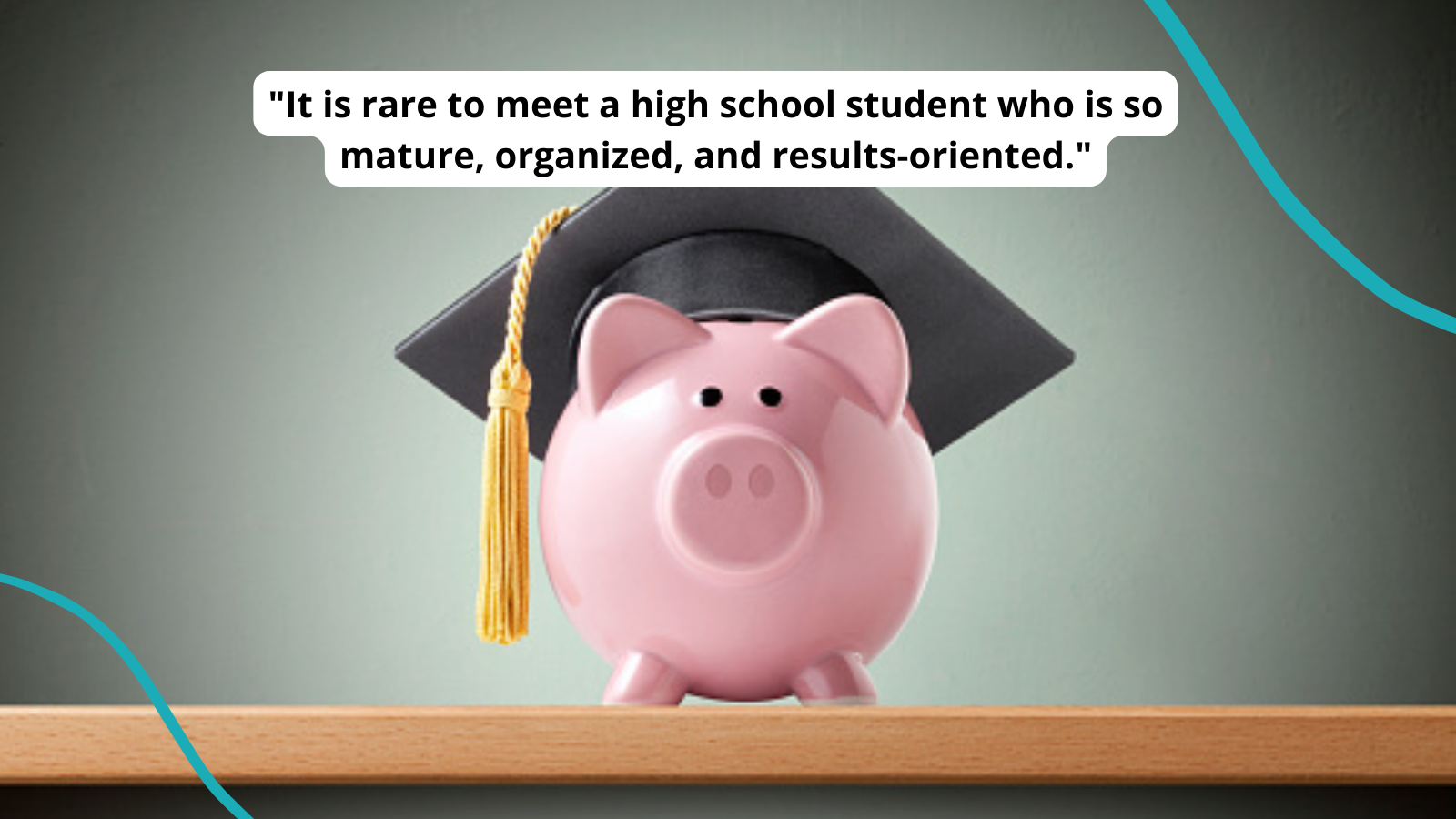
Paying for college takes a lot of planning. Tuition costs rise every year and graduates are buckling under the weight of debt from loans. For some, the expense of higher education is prohibitive, with many talented students being forced to cut their dreams short. Scholarships can make getting a degree more affordable. Students qualify based on academic performance, special interests, or financial needs. If you’ve been asked to help with the process, we’ve got you covered! Here’s a list of sample recommendation letters for scholarship applications that best meet your students’ needs.
How To Write Scholarship Recommendation Letters
If you’ve been asked to write a recommendation letter for your student’s scholarship, you might feel overwhelmed. You want to help your student, but you’re worried your letter won’t be good enough. In the end, you can only do your best, so lead with your heart and consider the following suggestions:
- Use letterhead and add your personal information (full name, title, school name, etc.) in the top left corner.
- Fill the whole page (at least 300 words) with an introduction, two or three paragraphs, and a conclusion.
- In the first paragraph, introduce your student, specify the scholarship for which they are applying, and share details about the nature and length of your relationship.
- In the body paragraphs, describe the ways your student is suitable and deserving of the scholarship.
- In your final section, pull everything together and emphasize your student’s strengths as well as the reasons why you are endorsing them.
Here’s a quick video on how to craft an effective scholarship recommendation letter:
Don’t feel you can honestly provide a positive recommendation? Gently decline their request for a letter. Avoid putting yourself in a position where you will have to be insincere. You don’t want to write something negative because it could cost the student an opportunity to earn a scholarship.
Sample Recommendation Letters for Scholarship Applications
1. general scholarship recommendation letter.
This is a great sample scholarship letter if you’re trying to offer a rounded view of a student’s performance in high school. You’ll include information about your experience with them as well as your thoughts on their potential success in a higher-education setting.
2. Sample Rhodes Scholarship letter
If your student is a candidate for a prestigious award such as the Rhodes Scholarship, this sample scholarship letter will give you an idea of what to share with the selection committee. With these types of recommendation letters, you want to provide as much praise and positive information as possible.
3. Scholarship letter for math students
There are many great scholarship opportunities for strong math students. This sample recommendation letter outlines how to share not only your student’s math talents but the other traits that make them a good candidate as well.
4. Leadership scholarship sample letter
This helpful scholarship recommendation letter offers an example for highlighting leadership skills. Back up your endorsement by sharing specific situations as well as participation in any committees, programs, and events where your student excelled.
5. Scholarship letter for international studies
Does your student plan to go abroad? If so, review this sample for writing a strong letter of recommendation for this specific type of scholarship. Be sure to include evidence as to why you believe your student is well rounded and exceptional.
6. Environmentalist scholarship letter
Has one of your students decided to pursue a degree in environmental sciences and wildlife? If so, this scholarship recommendation letter is a good example because it concisely highlights their strengths and shares why they would make a good candidate.
7. Scholarship letter for students who need financial assistance
No one should miss out on a college education because they can’t afford to pay. You can help them overcome this barrier! This excellent sample letter of recommendation shows the details to include for scholarships based on financial need.
8. Scholarship recommendation letter for STEM students
There are many scholarships for students who plan to pursue a career in STEM fields. If you’ve been asked to write a letter of recommendation for this type of scholarship, this sample will give you a good idea of what to include.
9. Greek society scholarship letter sample
Fraternities and sororities can be a great source of financial support for college and university students. Review this sample recommendation letter for scholarship applications for Greek society candidates.
10. Personal endorsement for scholarships
This sample recommendation letter for a scholarship application is best when you can’t vouch for the prospective student’s academic performance but want to share information about their personal character and how it relates to the scholarship program.
Do you have a great sample recommendation letter for scholarship applications? Please share it in the comments below!
Plus, check out the ultimate guide to college scholarships, want more articles like this be sure to subscribe to our newsletters ..
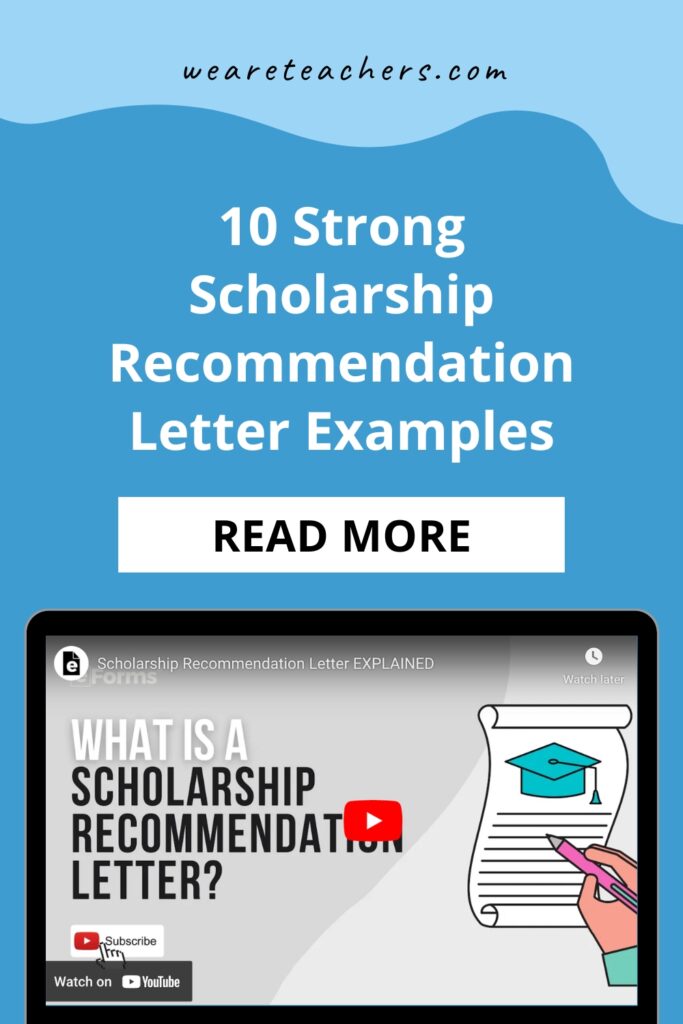
You Might Also Like
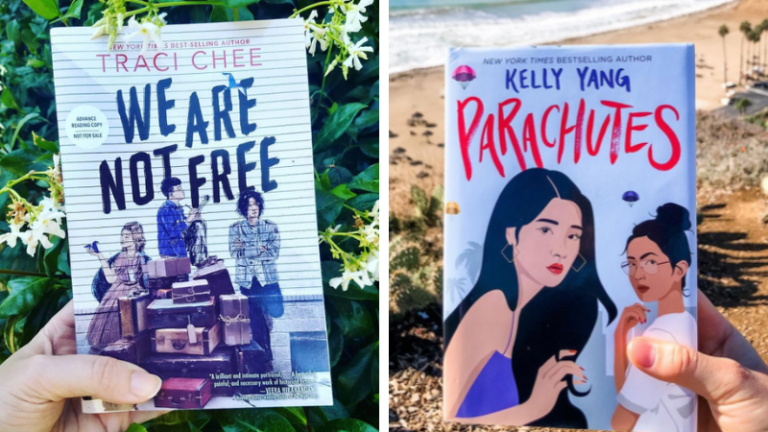
30 Books To Celebrate AAPI Heritage Month
It's a hugely diverse group. Continue Reading
Copyright © 2024. All rights reserved. 5335 Gate Parkway, Jacksonville, FL 32256
All Formats
17+ Scholarship Application Letter Templates – PDF, DOC
Education Template is one of the most important steps we have to take to reach our dreams, but it can be costly. Whether a college or university, undergraduate and postgraduate are not affordable, especially those that require other school facilities. Scholarship letters are not easy to write. You need to include any reason for applying for corporate funding, spouse sponsorship, and academic program. Are you picking a technical course or a 4-year major at a top school in the Philippines, US, China, or any country? We made professionally written samples for any individual or student to use. Find the best letters of applying format for your school.
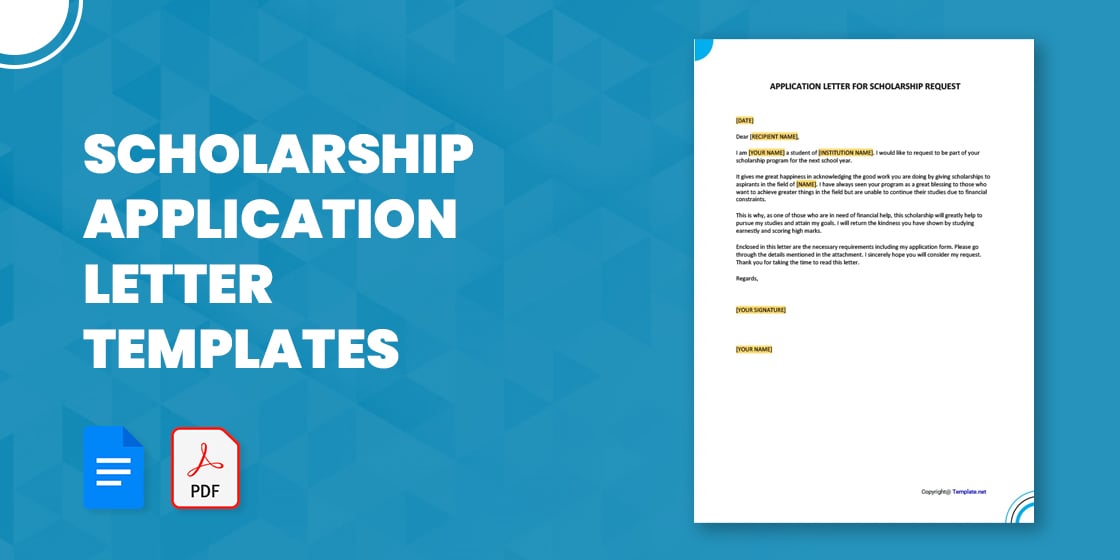
Free Scholarship Application Letter
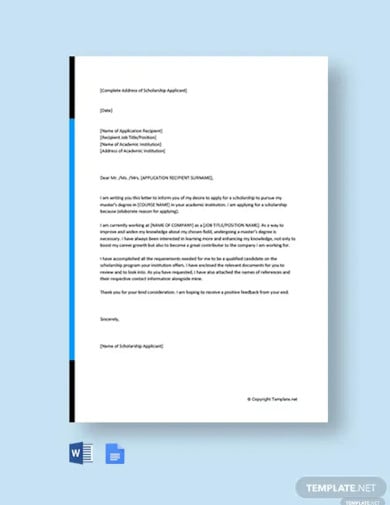
- Google Docs
Application Letter For Scholarship Request PDF
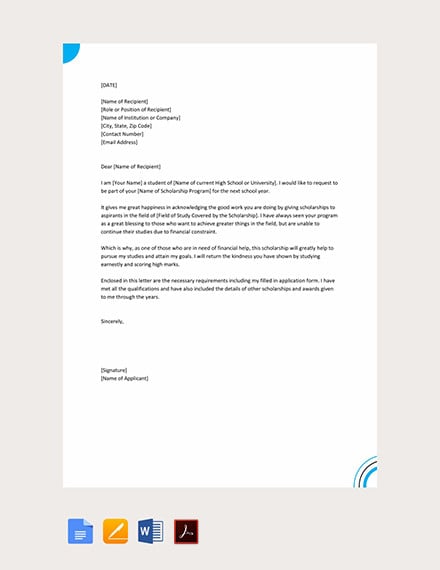
- Apple Pages
Scholarship Application Letter Sample
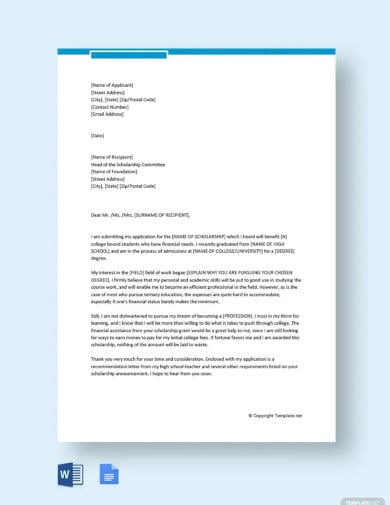
Application Letter For Scholarship Template
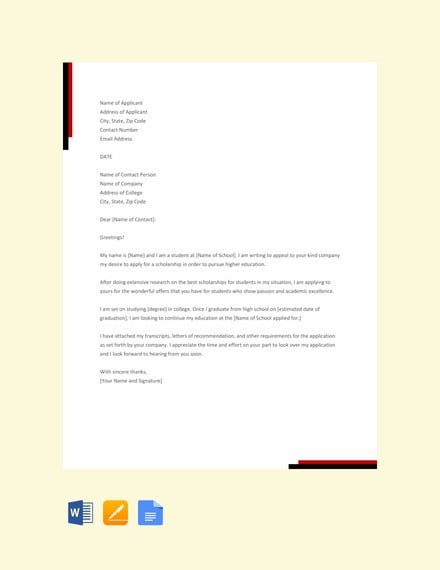
Application Letter For Scholarship In College
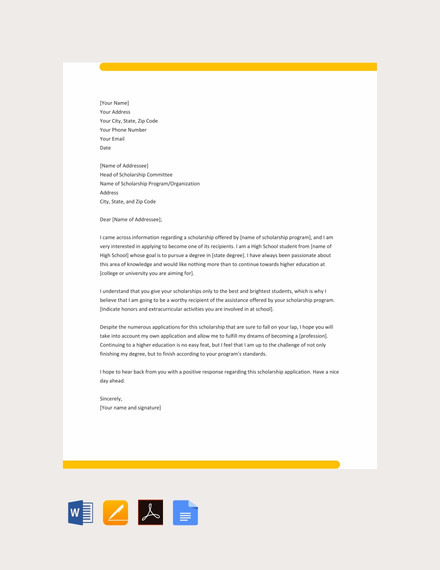
Letter For Scholarship Application Template
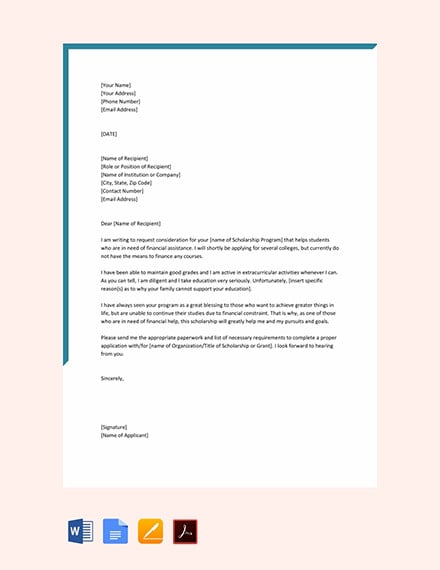
Letter For Applying Scholarship
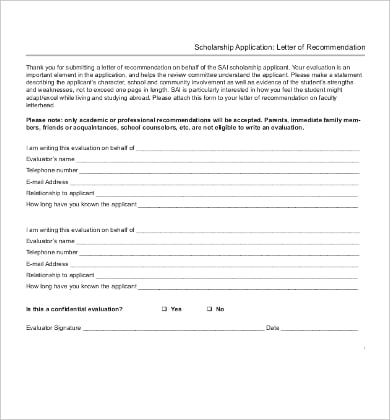
Example Of Application Letter For Scholarship
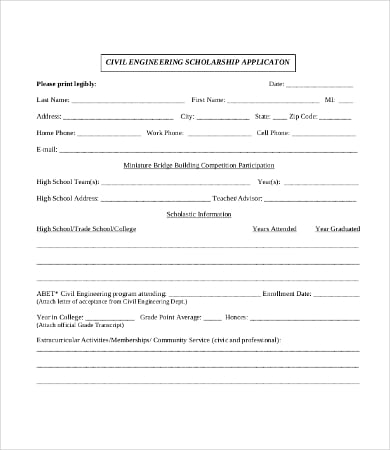
Sample Application Letter For Scholarship Grant
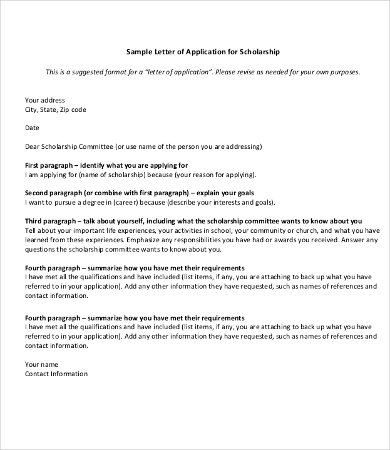
Scholarship Application Letter For High School Template
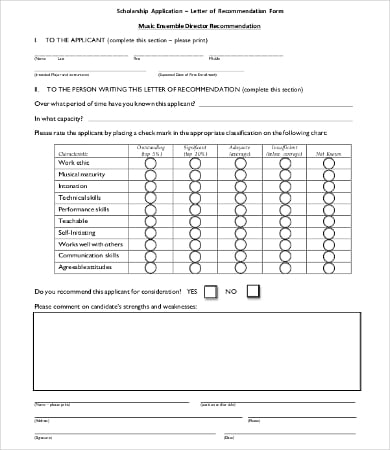
Short Application Letter For Scholarship
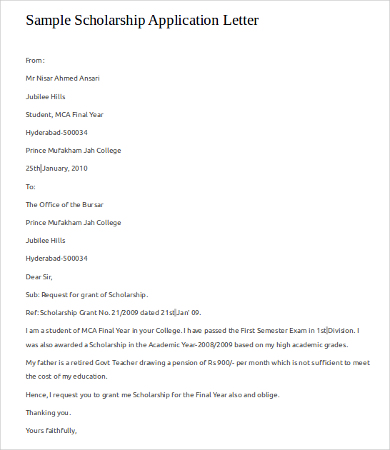
Teacher Academic Scholarship Application Letter Sample
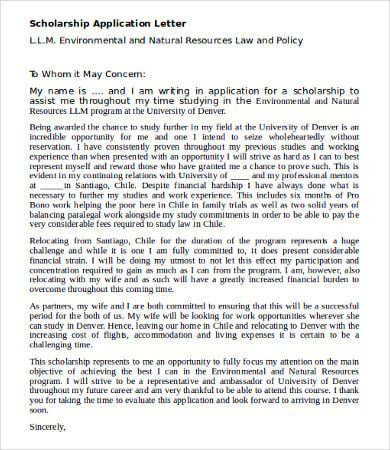
Scholarship Application Letter
- the scholarship department of the university for which the applicant is applying or
- numerous companies which offer scholarships for students who study specific courses.
Scholarship Application Letter Guidelines
Request scholarship application letter for individual student.
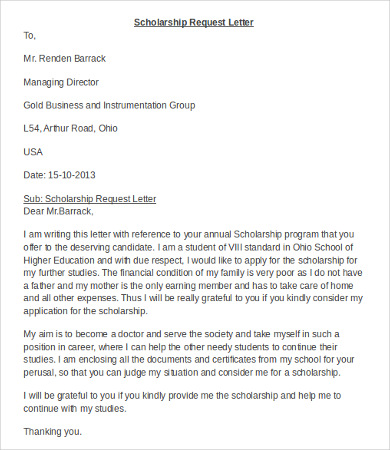
Philippines Scholarship Application Letter of Motivation Template
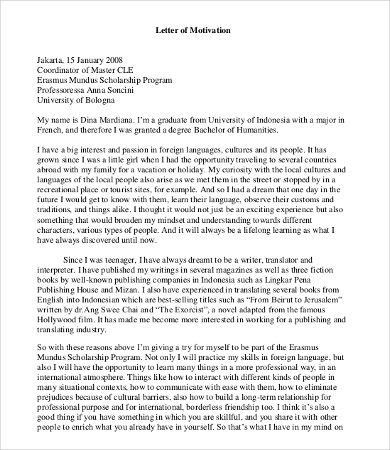
Free Graduate Scholarship Application Letter Template
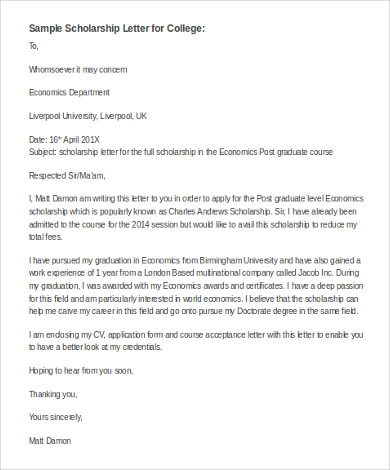
Spouse Certification Scholarship Grant Application Letter Template
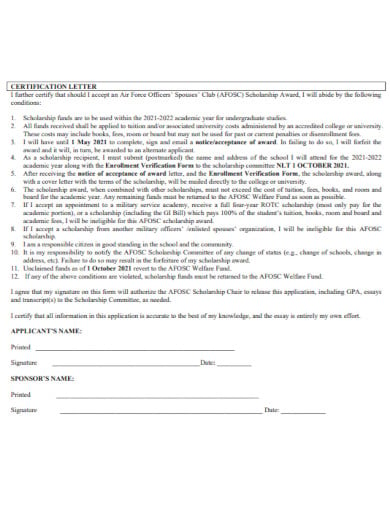
Corporate Funding Scholarship Application Letter Template
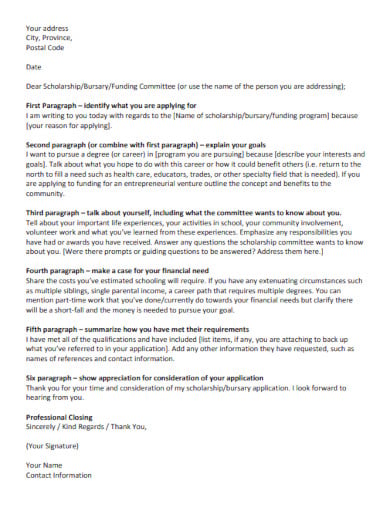
How to Apply for a Scholarship
- Get good grades, especially during the last high school year before your scholarship application .
- Know what you want and pursue it with single-minded zeal. Scholarship grantors view you as an investment so you need to show them that you know where you are going and that you will relentlessly pursue your studies and goals despite future obstacles.
- Research for the most suitable university for the course you intend on taking.
- Get organized. Before applying, make sure you have collected all your necessary documents such as SAT scores, high school transcript, college transcript (if you are applying for postgrad), parent’s financial information, and proof of eligibility for the scholarship .
- Send a timely and impressive scholarship application letter.
- Ask for a well-worded recommendation from your previous employers, professors, or school administrators. Tell them to write a Formal Letter that consists of narration of your stellar intelligence and other positive qualities.
More in Letters
Rejection letter for scholarship award, personal letter for scholarship application template, acceptance scholarship letter, visa application letter to embassy, information application letter, scholarship appreciation letter, scholarship award letter, generic thank you letter for scholarship, thank you letter for receiving scholarship, cover letter for scholarship application.
- FREE 26+ Covid-19 Letter Templates in PDF | MS Word | Google Docs
- Thank You Letter for Appreciation – 19+ Free Word, Excel, PDF Format Download!
- 69+ Resignation Letter Templates – Word, PDF, IPages
- 12+ Letter of Introduction Templates – PDF, DOC
- 14+ Nurse Resignation Letter Templates – Word, PDF
- 16+ Sample Adoption Reference Letter Templates
- 10+ Sample Work Reference Letters
- 28+ Invitation Letter Templates
- 19+ Rental Termination Letter Templates – Free Sample, Example Format Download!
- 23+ Retirement Letter Templates – Word, PDF
- 12+ Thank You Letters for Your Service – PDF, DOC
- 12+ Job Appointment Letter Templates – Google DOC, PDF, Apple Pages
- 21+ Professional Resignation Letter Templates – PDF, DOC
- 14+ Training Acknowledgement Letter Templates
- 49+ Job Application Form Templates
File Formats
Word templates, google docs templates, excel templates, powerpoint templates, google sheets templates, google slides templates, pdf templates, publisher templates, psd templates, indesign templates, illustrator templates, pages templates, keynote templates, numbers templates, outlook templates.
University letters of recommendation: an essential guide
Letters of recommendation can make or break a student’s university application, so it’s important that we get them right

Phillip Wenturine

You may also like

There are a plethora of documents that go into compiling the perfect college application. From transcripts to predicted grades, activity lists, resumés or CVs, essays, recommendation letters, certificates and more – each element of the application holds a different purpose and separate weight of importance, often varying from country to country and university to university.
By the senior year (Year 13), academics are nearly finalised, so there’s little wiggle room when it comes to improving that element of the application: senior GPA is set and calculated; IB predictions are nearly issued.
But beyond academics, some universities require recommendation letters, and this is where a student can stand out more, highlighting and emphasising their skills, qualities and abilities.
These recommendation letters can sometimes illuminate the true heart and soul of the student, beyond their transcripts or personal-statement essay. The words in these letters can make or break a student’s application, so it’s important we get them right and tell their story with the thought and effort it deserves.
Teacher letters of recommendation
In a teacher’s recommendation letter, students are brought to life beyond their grades, showcasing their holistic potential.
Teachers seize the chance to praise consistent academic excellence, to spotlight specific projects or skills, and to contextualise grade fluctuations resulting from personal circumstances.
These letters illustrate growth, revealing students’ readiness for university life. The emphasis is on articulating acquired skills and potential – a narrative far more impactful than grades alone. While an A-grade student may excel in tests, a B-grade student might exhibit invaluable traits, such as grit and resilience, best articulated through personalised advocacy.
Recommendation letter timelines
To support students and teachers, it’s important to highlight the importance of the teacher recommendation letter early on to teachers and students alike. Let students know as early as grades 10 and 11 (Years 11 and 12) that it’s important to build relationships with teachers well in advance of senior year. The best letters come from those teachers who have an excellent rapport with the student in question.
Ask students in the spring of junior year (Year 12) to select those teachers they would like recommendation letters from. The recommendation should ideally come from a core-subject teacher (maths, science, social studies, English) rather than an elective teacher, unless the elective is a field in which they intend to pursue a career.
To support the teachers, we work with students to compile what we call a brag sheet. Students answer a series of questions about themselves, in order to give the teacher the best context for writing the letter.
We tell teachers that if the student does not provide this brag sheet, or if they feel that the student has not performed well enough in their class to deserve a letter, they are allowed to respectfully decline the request to write the letter.
We also remind teachers that they do not need to agree to write any more than 20 letters. It is unfair if students all ask one teacher – who may then end up writing 60 letters – for a recommendation letter, while other teachers only have to write a few.. With that in mind, we also remind students of the importance of being organised and requesting the letter from their preferred teacher early on.
Writing the letters
Here are some examples of the questions we ask students on their brag sheets, which then give teachers a starting point for their letters:
- What do you hope this letter will show about you that your GPA doesn’t?
- What was a challenge that you faced in this class, and what actions did you take to overcome it?
- Describe how this class influenced you, either through academic content or teacher interaction.
- Give between one and three examples of times when you have exceeded expectations with your communication skills, and also some areas where you can reflect that you may need growth.
- What majors or careers interest you?
To support the teachers further, we host a writing workshop in the spring of each year to give them examples of strong and weak letters (all confidential). We coach them in "show, don't tell" when it comes to writing about students’ strengths, as well as giving them concrete examples of how best to advocate for students and highlight their strengths.
We review what each different country’s universities desire from these letters, as some universities – such as the US – appreciate a holistic view of the student (for example, highlighting student athletes or detailing extracurriculars). By contrast, the UK is very academic-focused and prefers to read about the student’s abilities when working on class projects, research and outside endeavours in the field of study.
Counsellor recommendation letters
Some universities – mostly in the US – also allow a counsellor letter of recommendation. This letter goes beyond academic ability in the classroom and speaks more to students’ characteristics, personality, outside involvement and external factors helpful for an admission committee to review in the context of other application documents.
The counsellor’s role is to fill in the missing pieces of an application: we help identify and tell a student’s story, covering any hardships, exceptional leadership abilities, impressive commitment to community and so on.
Now more than ever, admission committees are telling us that they trust the counsellor and teacher letters to help give them the full picture of a student, and to help them judge whether or not they will be the best fit for their incoming class and able to thrive on their campus.
We send our students what we call a junior questionnaire, in order to collect the information necessary to write these letters successfully.
Some examples of the questions on the junior questionnaire:
- What languages do you speak, and to what level of fluency?
- Please provide some details about your family and highlight any diversity and/or adversity that you have experienced.
- Have there been any major circumstances that have impacted on your personal or academic life?
- What are three adjectives you would use to describe yourself? Think deeply about this one.
- How have you used your time outside of school, and can you elaborate on any particular projects, clubs, work experience, internships, or volunteer work that speaks to consistency in an activity, leadership experience or a particular commitment to have an impact on your community?
External letters
Sometimes students may wish to have an outside recommendation letter from a coach – for example, if they are a student athlete.
Overall, references should be academic-focused, but some universities that accept more than one letter are willing to receive one from an outside observer, too. In these cases, the person should be someone who oversees the student as the coach of a sport or the supervisor of an internship or work-experience programme.
The external referee should give this letter to the counsellor to send off on their behalf, as all recommendation letters must confidential and never shared with the student.

IMAGES
VIDEO
COMMENTS
A scholarship application letter is a formal letter written by a student to an organization that provides financial assistance to support a student's education. Scholarships are available to students of all levels of education, from high school to postgraduate level. ... Scholarship in University Sample Letter for download. Application Letter ...
Scholarship application letter example Here's an example of a scholarship application letter for you to review: Robert Malone 554-765-0088 | [email protected] | Boulder, CO Wellington Student Fund Dear Members of the Scholarship Review Committee, My name is Robert Malone, and I'm a high school senior at Mile High Academy. Next year, I plan to attend Open Range University and major in ...
Start your motivation letter with a personal story or anecdote. Write in active voice (" I experienced this situation as stressful ") instead of passive voice (" This situation was stressful "). Use verbs that express thoughts, feelings and opinions, such as " I feel ", " I believe ", " I suspect ", " I disagree ".
The following parts make up an appealing scholarship application letter: First Part. Contact Information. Self Introduction and a Milestone achievement. Middle Part. Key details of you and reason why the committee should choose you. Expression of passion and reason why you want the scholarship. Last Part.
Application Letter Template for a Scholarship Request. Dear [Recipient's Name], I am writing to express my earnest interest in the [Scholarship Name] offered by [Institution or Foundation's Name]. As a dedicated student of [Your Field of Study], I am committed to my academic pursuits and am eager to overcome financial barriers to achieve my ...
Motivation letters are usually required for graduate-level scholarships. Sometimes, you may need to write one for specialty programs at a bachelor's level too. ... This extra time will provide the best chance of success with your application. A Sample Scholarship Motivation Letter. Date. Julie Moore 9876 Smith St. Stillwater, OK 74074The ...
Your relevant work experience. Don't make your motivation letter simply a copy of your CV. Describe specific situations and give examples that show your growth and holistic potential. Your educational background. Highlight any academic achievements related to the scholarship or organisation you are applying to.
Write a Successful Motivation Letter for Your Master's ; How to Apply to Universities Worldwide and Tips for Being Accepted ; What Documents Do You Need to Apply for a University Abroad? 6 Steps to Writing an Awesome Academic CV for Master's Application
Scholarship Cover Letter Sample First Paragraph—Undergraduate Scholarship. Having been accepted to UT Austin for the 2019 fall term to pursue a Bachelor's in Architecture, I am writing to express my desire to participate in the University Leadership Scholarship Program. You will see that these speak for themselves.
Scholarship Application Letter Templates & Samples Whether you are writing a scholarship application letter to gain admission to a university or college, appeal for financial assistance, or apply for further postgraduate studies, you can download and use our Free and premium templates and quickly customize them to fit your specific needs and ...
The template below outlines the purpose for each paragraph and what it should include: Your Name. [Your phone number] [Your email address] [Your mailing address] [Date] [Scholarship organization name] [Organization address] [Organization phone number] Dear [Mr./Ms./Mx. Recipient's name] / [Scholarship Committee],
Example cover letter for a scholarship. Consider this example of a cover letter for a scholarship to help guide you as you write: Dear Ms. Adams, My name is Eloise Barone, and I'm writing to submit my application for the Ridge Hills University financial aid program for the spring 2024 semester. I'm currently a first-year student enrolled in the ...
Learn how to write a scholarship application letter by taking the following steps: 1. Examine the eligibility requirements for the scholarship. The scholarships you apply for vary in terms of expectations, requirements and preferences. Carefully examine the specific requirements of each scholarship you're considering.
The best way to do it is by including "Dear", then addressing the name of the committee with a Mr. or Ms. 3. Opening letter. Now is the time to get into your paragraphs of the scholarship cover letter. In this paragraph, you should make a brief introduction of yourself including your experience.
Related: How To Write A Good Recommendation Letter For Scholarship Application (8 Sample Examples PDF) ... Whether you are writing for an undergraduate scholarship award, or a cover letter for masters' scholarship, or a cover letter for PhD scholarship, you need to ensure that your cover sheet for scholarship application meets the application ...
That said, it is of the utmost importance that you find a focus. First, think about both your goals and your values. Types of goals include: Career goals. Goals for personal growth. The type of friend you want to be. The change you want to make in the world. Values could include: Authenticity.
Sample Letter of Application for Scholarship This is a suggested format for a "letter of application". Please revise as needed for your own purposes. Your address City, State, Zip code Date Dear Scholarship Committee (or use name of the person you are addressing) First paragraph - identify what you are applying for
The letter is expected to have 500 - 1000 words content and be flexible to fit your motivations and goals. A motivation letter for a scholarship is structured into 5 parts: Header, introduction, work experience, education, and conclusion. Now, let's look at how to write a good motivation letter for scholarship.
An important part of the application process for a Master's degree at an international university is the motivation letter (or cover letter) you are required to write. But how to write the best motivation letter? And why is it so important, anyway? A well-written letter can be a decisive factor in ensuring you a place in your desired Master's programme. It is probably the most personalized ...
Keep the ending of your essay for master degree application concise and memorable, leaving no doubt in the admission officers mind that you deserve a spot on the program. ... How To Write A Good Motivation Letter For Scholarship (4 PDF Sample Examples). How To Write A Letter Of Intent For Scholarship (4 PDF Sample LOI Example). Share this tip ...
Some scholarships ask for specific information to be addressed in the cover letter. This is where you would put that information. Closing Paragraph: Refer the reader to your enclosed application, résumé, transcript, etc. and thank them for taking the time to review your application. Left & Right 1.5".
1. General scholarship recommendation letter. This is a great sample scholarship letter if you're trying to offer a rounded view of a student's performance in high school. You'll include information about your experience with them as well as your thoughts on their potential success in a higher-education setting. 2.
Scholarship Application Letter. A scholarship application letter in PDF is a letter that an applicant who wishes to study in an educational institution and lacks financial backing would send to . the scholarship department of the university for which the applicant is applying or; numerous companies which offer scholarships for students who study specific courses.
There are a plethora of documents that go into compiling the perfect college application. From transcripts to predicted grades, activity lists, resumés or CVs, essays, recommendation letters, certificates and more - each element of the application holds a different purpose and separate weight of importance, often varying from country to country and university to university.